Student Stories
- Details
- Written by: Elyse Simich
We are proud to announce our 2019 Student Ambassador is Tatenda Nherera. He is a member of EIT’s alumni community and will now be representing our current and prospective students.
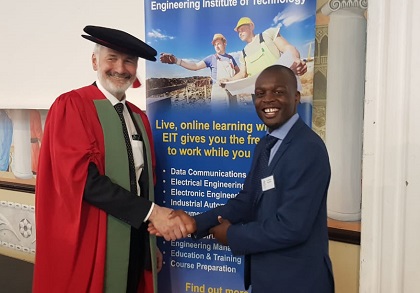
Tatenda recently graduated from EIT’s 52684WA – Advanced Diploma of Electrical and Instrumentation (E&I) Engineering for Oil and Gas Facilities. He said EIT’s online delivery mode allowed him to continue working full-time, while improving his instrumentation knowledge and technical writing skills. This newfound expertise helped him in his work with the Eastern Cape Department of Health and Department of Public Works; his main responsibilities include servicing, maintenance and repair of their key and sophisticated steam boilers, laundry and kitchen machines for many Health Facility and Correctional Service Centres in the South African province.
Tatenda began studying engineering in 2008, when he enrolled in the Gweru Polytechnic College in Zimbabwe as an electrical power student. He then began studying with EIT in 2015 — now he’s completing his Bachelor of Science (Industrial Automation Engineering) with us.
“I will remain employed and still study part time as I did on my previous course. The studies are giving me more meaningful skills, and contributing to the African society, where engineering skills like mine are very scarce,” he said.
You can view Tatenda’s professional LinkedIn profile here: https://www.linkedin.com/in/tatenda-nherera-40440a61/?originalSubdomain=za
If you would like to find out more about his experience studying with EIT, please email
- Details
- Written by: Quintus Potgieter
McLeod Boipuso Sibanda is a dedicated scholar and works hard in the worlds of geology and engineering.
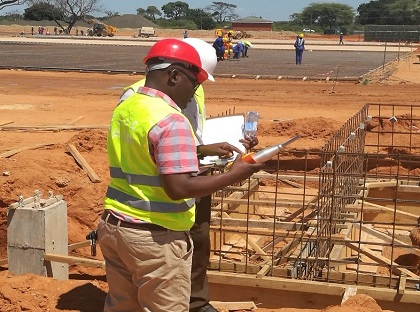
He is a husband, a father of three children, and the Managing Director of a reputable civil engineering company in Botswana.
He was born in the village of Pandamatenga, Botswana, and as a youth he realized he had the knack for engineering.
“From a young age I was passionate about Mathematics and Physics and the civil engineering industry suited my passion for application,” he said.
He holds certificates in Rock Identification and Geotechnical Core logging, Soil Profiling and Chip Logging from the South African Institute for Engineering & Environmental Geologists. He also has a Laboratory and Field Techniques certificate from the University of Cape Town, and he recently graduated with an Advanced Diploma in Civil & Structural Engineering from the Engineering Institute of Technology. He is putting those qualifications to good use. He says:
“I have over 21 years of progressive experience in Civil Engineering, working in the fields of soil mechanics, geotech, laboratory testing and rock mechanics. I will apply what I learned to sharpen my technical writing of geotechnical reports, analyzing all standards of building specifications, boosting my confidence in structural engineering. Most importantly, to share my knowledge and expertise with others.”
He is a hands-on aspirant engineer who works on the development of infrastructure - roads, bridges and tunnels. He is also involved with water and sewer reticulation design, foundation engineering and project management.
McLeod notes that one of the highlights of his career was working on the Kazungula Bridge and Border — a construction that provided a link between Botswana, Zambia, Namibia and Zimbabwe.
McLeod is currently pursuing his Bachelor of Science in Civil and Structural Engineering through EIT. Thereafter he plans to obtain his Masters in Geological Engineering. He believes these qualifications will take his company to greater heights. He concludes:
“Hard work, dedication, success and the desire to achieve whatever goal I set motivates me to keep dreaming.”
Despite being in the midst of his continued professional development, McLeod wrote a book. It is an autobiography which details his childhood and upbringing. It is called: Triumph Awakens In The Midst Of Turbulence.
- Details
- Written by: Quintus Potgieter
On Friday, 23rd November, at the Engineering Institute of Technology’s Graduate Gala Event in Perth, Brian Lord was awarded the 2018 Graduate of the Year. He recently graduated from the Engineering Institute of Technology’s Advanced Diploma of Applied Electrical Engineering (Electrical Systems).
There are two reasons why this is remarkable: firstly, he now has another qualification under his belt and secondly, he worked full time while he studied. Like many EIT students, Brian had to become an even more astute juggler — he is also a husband, a father of three, a father-in-law and a grandad to two grandchildren.
Brian lives in a small regional city on the Victorian – NSW border in Australia, named Echuca, boasting a population of around 14,000 where he is an electrician by trade.
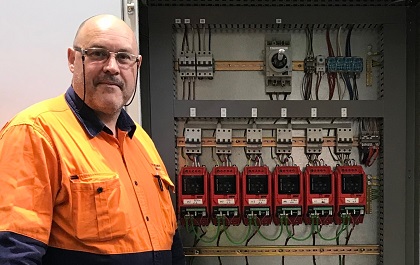
Despite enjoying his work and having worked Australia wide, he began searching for something that could really challenge him and boost his career. Brian has hankered after becoming an Electrical Engineer, but wondered how he could ever do the required study and retain his job. His employer, Foodmach Pty Ltd, to his surprise, agreed to support his ambitions.
“I’ve never heard of an employer in a small regional city giving a 52-year old employee that sort of an opportunity before; so I grabbed it with both hands, heart, head, and feet,” he said.
Brian applied for EIT’s Advanced Diploma because the learning platform is online and flexible, allowing him to continue working without the need for time off work to attend classes. EIT’s approach to learning is also very interactive; the instructors run tutorials in real-time and students interact with the instructors and each other.
“When I researched every Univeristy I could think of in Australia there was 'not one' that had this complete online platform for Electrical Engineering. I’d almost given up until at the request of my manager Gavin Alder, I researched for one more week,” he said.
“Low and behold I found the Engineering Institute of Technology online AND they offered 'exactly' what I’d been looking for.
“As much as my employer Foodmach was already prepared to support me, this also really helped to sway them all the way, without any worries about labour re-scheduling for schooling time off.”
Brian describes the course as the 'light bulb' that changed his electrical life and opened his mind. Having covered variable speed drives, induction motors, mathematics and much more, he reflected back to his trade school days and wondered why they hadn’t included some of EIT’s modules.
“The knowledge and skills alone, gained with the completion of the Advanced Diploma of Applied Electrical Engineering, has given me a considerable boost in confidence at work as a Trainee Electrical Engineer,” he added.
“I now find others, whom I consider more experienced in the electrical field, regularly seeking my advice; this has given me added confidence.”
Watching his progress through the course and noticing his growth in knowledge and skills, his employer tasked him with the electrical design of three new, small to medium sized projects.
Like most EIT students before him: holding down full time work and embarking on a new qualification, Brian found the new academic lifestyle something to get used to.
“A huge challenge for me as a 52-year old, going back to study whilst working full-time, was arranging and organising my time much better.”
The online delivery of EIT’s modules was an interesting beast to tame, but Brian eventually got the hang of it. He built up a rigorous study routine which included extensive note-taking during webinars, re-watching webinars three or four times, and attempting to ensure he had a clear understanding of all the information he was being presented with.
His resilience and determination resulted in him achieving some of the highest marks in his class.
Brian’s successes prove that you can indeed teach an old dog new tricks. He concludes:
“I’m absolutely stoked to now call myself an 'Associate Electrical Engineer'; recognised by Engineers Australia and to add these post-nominals after my name, Grad AIE Aust. This now helps me get into the next stage of my career; studying a Bachelor of Science to become an 'Electrical Engineer'.”
Now at 53-years of age, Brian appears to be as motivated as ever to achieve; part of the reason why EIT has honored him with the award. And we wish him all the very best with both his career and the next phase of his studies.
- Details
- Written by: Quintus Potgieter
Johannes Kapeuasha is a graduate from the Engineering Institute of Technology and at our 2018 African Graduation Gala in October he was awarded Graduate of the Year.
After completing high school in 2007 he enrolled at a college in Bulawayo, in Zimbabwe. Here he completed a certificate in computer science (database systems) and then another one in 2009 which certified him to work as a computer technician. He worked in the field for a year, but felt he needed to learn more and kick-start his career. He said:
“I decided that I wanted to be part of the robotic and artificial intelligence revolution. For me, to be part of this revolution, I immediately realized that I either had to do software engineering, electrical engineering, or mechanical engineering. I ended up choosing electrical engineering.”
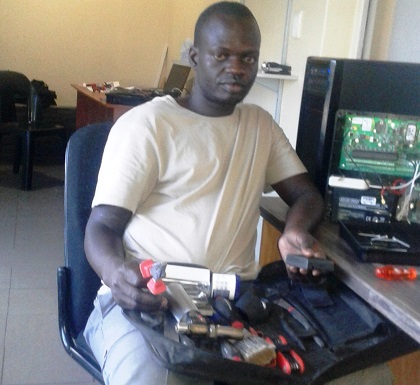
He joined the Namibia Institute of Mining and Technology (NIMT) and began studying towards the Electrical Engineering Millwright Trade. At the same time he began an internship at Namibia Dairies where he was exposed to the industrial side of the industry. In the last year of his internship in 2014, just before his trade test in 2015, he enrolled for a National Diploma in Electronic Engineering at a South African college named INTEC College.
He passed his trade test on his first try and graduated from INTEC in 2016.
Johannes is a true believer in the opportunities that education offers (and is certainly not afraid of hard work). He has since graduated from the Engineering Institute of Technology; he completed the Advanced Diploma of Applied Electrical Engineering (Electrical Systems).
While studying with EIT (which is structured to allow students to also work full time), he realised that there was something preventing him from thriving. He said:
“The job market in Namibia at the time was not favourable. It was really hard to get jobs at that time; however, I was able to make a living as a private electrical contractor, until the situation became so desperate that I was not able to get small jobs anymore.”
As a result, Johannes settled for a security guard job for a local company named Inter Africa Security Services and then later, Omega Security, which helps protect one of the busiest malls in Windhoek, in Namibia. While with this company, this year, Johannes’ luck turned around: Omega Security promoted him to the Industrial Security System Technician role. And he is enjoying his work:
“I love hands-on tasks. I love solving technical problems and having a chance to work in the field that brings me fulfilment each and every day. Technology is really growing fast, and changing everything around us and how we interact with our environment. I am truly fortunate to be part of one of the recent developments - remote arming of home security systems.”
At our Graduation Gala in South Africa, Johannes was overjoyed to be named 2018 Graduate of the Year. He is pleased to have been rewarded for his efforts in the face of overwhelming financial hardship and challenging time constraints.
“What my engineering career has taught me, if I were to sum up my career thus far, is not to be afraid and to work hard. Do not look at other professions and look down at them. Every industry needs an engineer. If you believe in something, go for it - do not let anyone say you cannot do it. You can achieve great things; all you need to do is just believe. I am living proof that anyone can achieve anything they put their minds to. Do not be afraid to dream...dream big.”
Johannes is determined and believes in himself, but these alone have not been enough to enable him to achieve all that he has. He makes it clear that without the support of those closest to him none of this would have been possible.
He wanted us to include a “special tribute to the people who made me who I am today.” His special thanks go to his mother, Mrs. Menete Kapeuasha, to his sister, Josephina Kapeuasha, to his faithful best friend, Ms. Bella Kavungo, and to his manager, Mr. Francois Van As.
Congratulations Johannes, from all of us at EIT, and our heartfelt thanks also go to your wonderful support team.
- Details
- Written by: Quintus Potgieter
Mthulisi Mlalazi Thenga is a 28-year old, qualified Control & Instrumentation technician. He mainly specializes in system integration & automation. In 2005, Mthulisi graduated from high school in Zimbabwe, but decided to migrate to Botswana. He would visit Kgalagadi Breweries in the region and be fascinated by the automated processes at the plant. He ended up spending some time in the technical departments there assisting with the electrical, control and instrumentation technologies.
As a child Mthulisi found he had a profound love for machines. He was also keen to discover how electricity was generated. Clearly he was already actively – but perhaps even unconsciously - trying to find which niche of engineering and technology he would fit into as an adult.
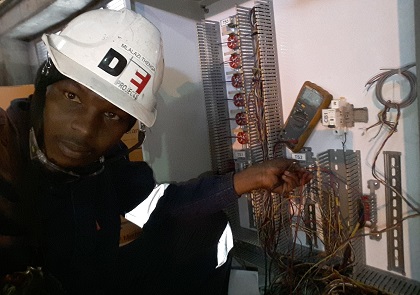
“Finally I realized my loyalty was in Control Engineering. I went back to Zimbabwe to start my tertiary education at Bulawayo Polytechnic College. I worked hard and excelled,” Mthulisi said.
As a result he qualified as an electrical technician and a registered qualified specialist in the following disciplines:
- Industrial communication.
- Networking and high speed nonmetallic communications.
- Control systems engineering.
Through EIT, he completed further studies and graduated with an Advanced Diploma in Electrical & Instrumentation (E&I) Engineering of Mining and an Advanced Diploma of Applied Electrical Engineering.
During his apprenticeship Mthulisi’s work included the maintenance of heavy industrial equipment; since then he has moved up into system integration and automation.
Incredibly, he has had a hand in either modifying or commissioning projects at thermal power stations in South Africa, at the Unilever plant in Kenya, at the Dundee Precious Metals smelter in Namibia, at the First Quantum Minerals Kalumbila mine in Zambia, and more.
And he says of his work, “I automate and breathe life into chemical plants, water treatment plants, manufacturing firms and mineral processing plants,” he said. “I am passionate about control systems and I have been on teams that have worked hard to make the world a better place.”
The online platform that EIT employs must be scrutinised and who better to do this than the students using it.
Mthulisi’s assessment is insightful; he does not hesitate to outline the challenges faced by someone working long, hard shifts and studying online at the same time. He warns people off, “if you have problems with motivation, procrastination and need lots of individual attention from an instructor.”
On the other hand he states, “Online training is the future”. He believes it teaches students to become “survivors”, “…it taught me how to plan and how to be responsible”.
He loved the flexibility and savings – with a computer and internet he was able to study anywhere and, because he did not have to commute to and from a campus, he saved time and money.
He was kind enough to describe the EIT online platform as “outstanding” because of the uniqueness of its remote labs, student access to library resources and the live streaming of the webinars twice daily (which are also recorded for revision purposes).
Mthulisi did, however, point out something that EIT is poignantly aware of: “Some content isn’t ever offered in an online format. For example, you can watch a hundred videos on welding, but until you have that welder in your hand, you’re never going to master your technique”.
In closing, the following advice from this proactive, driven and passionate young man is also worth sharing: Keep in touch! Listen to business and engineering leaders on LinkedIn and on other social media forums! And actively contribute! He believes this helps him “grow and transform day by day”.
- Details
- Written by: Quintus Potgieter
Brian Masemola graduated high school in 2006. By 2007, he had joined a college and started studying Instrumentation, which led to an apprenticeship with Anglo American Thermal Coal in 2009. In 2012, he qualified as an Instrumentation Mechanician after completing his National Diploma in Instrumentation.
In 2016, he joined the Engineering Institute of Technology, pursuing an Advanced Diploma in Industrial Automation. Brian had subsequently unlocked a new community of engineers he had never come across before.
“I met people from various countries. It was awesome! We networked, exchanged information and shared experiences. EIT’s set-up is great and convenient — especially for someone in the working class. It’s always awesome for the fact that classes are attended in the late evenings, it is a comfortable space for the learner.”
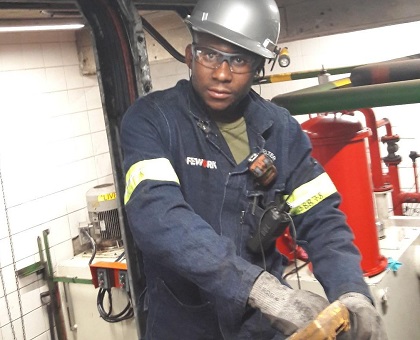
He is currently working in the chrome smelting industry, where his daily responsibilities include the installation and commissioning of new instruments. He also assists with the maintenance and breakdown attendance of the raw material, pallets and kiln section. He says that the industry is undergoing technological growth in Control & Instrumentation in respect to safety of personnel and safeguard machines.
Now, he is working at one of Glencore’s chrome smelters as an Instrumentation Technician. And he is a proud EIT graduate. He said:
“Today, I’m an Advanced Diploma graduate and still looking for better opportunities and pursuing my studies with EIT. I am looking to work towards getting a Masters.”
Brian notes he has amassed very useful knowledge during his time in the course. While he was studying through EIT and employed in a position at work, he figured that he could strike the perfect balance of work and studying.
“I drafted a little time table. I allocated times for working, studying and resting — with break intervals included,” he said.
Brian notes that the motivation to keep studying and leveling up in his industry comes from seeing the success of the new generation of engineers filling high level positions in companies around the world. He is aiming to ascend to those high level positions too. He says he also wants to become so proficient in engineering that he can eventually invent something useful for the betterment of mankind.
- Details
- Written by: Quintus Potgieter
Martin Mutale works in the mining industry.
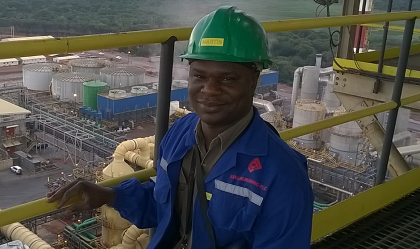
He began his career with a craft certificate in electrical systems. After working for five years, he pursued a diploma in electrical engineering at a university in Zambia, which he did not complete.
After another seven years in the industry he realised that he had to upskill. Through the Engineering Institute of Technology (EIT) Martin now has two qualifications, a Professional Certificate in PLCs and SCADA Systems and an Advanced Diploma of Applied Electrical Systems.
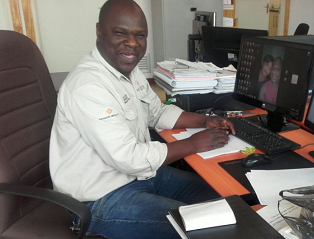
Mutale is proud to claim that he can ‘design and develop a project to completion’ with the skills he has gained through work and study. It is also clear, however, that his love for the industry enables him; he describes his project work as fascinating, ‘from installation to commissioning.’
Mutale notes that the flexibility of EIT’s training curriculum allowed him to study and work at the same time. When he understood that he needed to gain professional development, he also knew he had to continue to work; finding EIT facilitated both.
Martin has always regarded a career in engineering his dream. He believes that studying through EIT was merely a logical step towards furthering his ambitions in the field. He said:
“Throughout my working years, I have been exposed to a lot of engineering systems and yet I had no higher education. When I shared this with my wife, she was like the one doing the course - she was so supportive! The day I started learning, that was the day I started applying the skills EIT equips you with.”
Martin is now mulling over the possibility of pursuing his Bachelor of Science in Electrical Engineering. He notes, however, that in order to do this he needs to find the correct balance between being a father and studying.
- Details
- Written by: Quintus Potgieter
Marcel Maughan is an Automation and Breakdown Specialist for a company named IMP. The company is a world leader in automating sample preparation and analysis equipment for mining and sample laboratories. His responsibilities include installing, servicing, and repairing the automation equipment at IMP.
A career in automation, however, has been quite the journey for Marcel. He completed high school in 1997, with a dream of becoming an Electrical Engineer. The only snag was his family could not afford to send him to university. Instead he decided to find work. Reflecting on that time in his life, he said:
“Unfortunately my dreams seemed to be out of reach. I applied for many jobs and went for many interviews without success. For three years I was unsuccessful in every application, but I worked day and night as a barman and later as the bar manager. I made just enough money to pay rent and do a semester at college, where I studied Electro Technics and Industrial Electronics.”
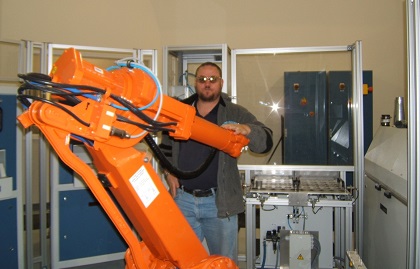
His persistence and hard work helped Marcel eventually get his foot into the right door. In March 2000 he found employment with IMP where he was employed as a Junior Technician. During this time he pursued a Certificate of Compliance for Force and Mass Metrology which qualified him as a Metrologist.
Thereafter, but still with IMP, he was recruited onto an automation project. He was hooked and knew he wanted to be in automation for the rest of his career. His hunger for knowledge was realized by IMP; they sent him on various PLC and Robotics courses. He even completed an advanced course in Robot programming.
His next course was a Profibus Installers course which qualified him as a Profibus engineer. These accumulated achievements won Marcel his Senior Automation Technician status.
About the ever-changing automation industry, he said:
“The automation industry is constantly changing. More and more people are turning towards automation for safety and production reasons. The most fascinating part is being involved in the Automation evolution.”
But there was no slowing Marcel down, in 2011 he completed his Electrical trade and became a qualified Electrician.
In 2016, wanting to augment his professional development, Marcel stumbled across the Engineering Institute of Technology (EIT). His employer agreed to assist him and he registered for the Advanced Diploma in Remote Engineering, Mechatronics and Robotics. 18 months later he completed his final assignment and received his qualification.
He believes his studies have been enhanced because of his solid and ongoing experience in industry.
It seems that striving for excellence and determination are the key: Marcel is an example of how these qualities can elevate someone and then assist him/her to continue to improve exponentially. He said:
“Success comes from doing it right. The FIRST time! And on time! If you do this in all your tasks you gain a sense of pride in what you do. If that can’t motivate you, then there will be few things that will.”
He has some advice for students and engineers determined to improve as practitioners in the engineering world.
“Experience is probably the most valuable aspect of your career. Second to this is studying and learning while gaining experience. I am determined to continue to learn and gain more experience as I go. In terms of furthering my studies, Electrical Engineering will be my main focus.”
- Details
- Written by: Quintus Potgieter
Murray Langley attended a career exhibition during his final year of high school. He came across a stall run by the South African Institute of Measurement and Control (SAIMC) and knew that he had found what he was looking for. He applied for a trainee position in the Instrumentation and Automation field with Iscor Ltd (now part of the steel company Arcelor-Mittal). He filled the position straight out of high school and has never looked back.
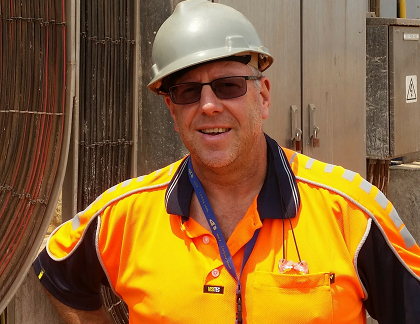
He began further studies in 2011 and has completed an Advanced Diploma, two Graduate Diplomas, the Master of Engineering (Industrial Automation) and more recently embarked on a Master of Engineering (Electrical Systems) - all though the Engineering Institute of Technology (EIT).
Throughout his career Murray has worked in the Steel and Aluminum Smelting and Mineral Sands mining industry. Currently though, he is working in the Democratic Republic of Congo (DRC), at the Kamoto Copper Company (KCC). His responsibilities include E&I Engineering and the daily management of contractors who are building the E&I component of KCC’s copper precipitation plant.
In the last three decades, Murray has seen automation within the industry evolve. He said:
“Over 35 years in the Instrumentation, Automation and Control industry, I’ve worked with pneumatic instruments and controllers and mimic panels covering control room walls. I have been involved in automation upgrades, Smart MCCs, networked instruments and state of the art control rooms. It has been a fantastic journey.”
Murray asserts that his studies through EIT have been part and parcel of his professional development over the past 7 years. Balancing work and studying took dedication and commitment. When asked about what motivated him through his many qualifications, he said: “The sense of achievement when I finish what I have started”.
- Details
- Written by: Quintus Potgieter
Sebastian Govender works for oil giant Saudi Aramco. He works in the Project Management Division, in Mega Projects in the Oil & Gas industry, in Jazan Economic City.
When he began working in Saudi Arabia, in 2013, he worked on the Jazan Refinery Mega Project. He was on the Project Management Team as an instrumentation engineer, specializing in Detail Design. He then moved over to PMT Construction. He currently manages the construction/pre-commissioning for E&I in the Gas Treatment Unit (GTU).

For him, the most fascinating developments in the Oil and Gas industry have occurred in the ever-evolving process control systems, which, he says, have made life a lot easier in the refinery.
On why he pursued a career in Oil & Gas, Govender said:
“The reason I have chosen to work in the O&G industry is because I love the ongoing changes in technology of refining, and the challenges faced in the day to day operations. I love the environment, being surrounded by engineers sharing ideas and troubleshooting - and the passion I have for what I do is motivating.”
Govender studied the 52684WA - Advanced Diploma of Electrical and Instrumentation (E&I) Engineering for Oil and Gas Facilities through the Engineering Institute of Technology (EIT). He had searched far and wide for an accredited institution that would allow him to study remotely. He said:
“I am South African and working abroad makes it difficult to study and work due to leave needed for examinations. I then came across EIT online while searching - finding this institution was the best thing that ever happened to me (except for finding my wife and having our daughter). The training I received was exceptional for an online platform. The LABs and the lecturers were very informative and hands-on.”
And what is Sebastian’s next study plan? To gain some professional development on EIT’s Professional Certificate of Competency in Project Management for Engineers.
Despite his commitment to online learning he admitted that studying whilst working takes a level of motivation. This is driven by his passion, he says:
“My motivation comes from the passion I have for engineering, construction and interacting with the diverse people you meet in the industry. If you love what you do, you are never bored and never have any negative vibes in the work environment.”
- Details
- Written by: Miriam Munitz
As we rapidly move through our first year of hosting on-campus students, we are consistently experiencing lots of ‘firsts’. In their first year of study, our students take part in a site-visit to gain a little insight into the engineering industry they have chosen.
CELEBRATION OF SUCCESS
Recently, one of our first-year Bachelor of Science (Civil and Structural Engineering) students, Hamza Baig completed his first industrial site-visit. I had the pleasure of interviewing Hamza, who was very excited to share his experience.
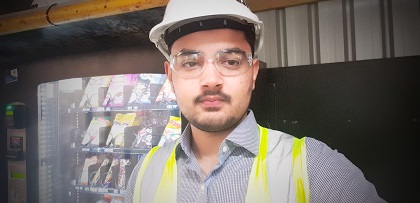
How did you know which companies to contact?
I went through the ‘top Australian companies’ contact list provided by the unit co-ordinator and highlighted those in Perth.
I then used the template letter on Moodle and sent Pro Build an email, introducing myself and requesting a day on-site. Within a very short time they replied, providing me with the site-manager’s details, who then put me in touch with the site co-ordinator. We confirmed and agreed I would be there at 9am, on Tuesday 11 September 2018.
Were you asked to wear any specific clothing?
I was asked to wear a long-sleeved shirt, long pants and safety boots. I explained that I did not have safety boots, and fortunately they had a spare pair I could borrow for the day.
How did you identify yourself when you arrived on site?
I wore my EIT student card around my neck. Both the site manager and the co-ordinator were interested in who EIT were, as they had not heard of our college. I explained that we are a well-established online engineering college, but that the campus in Perth only opened at the beginning of the year.

How did you spend your time on site?
I had the opportunity to visit two sites — one was a 35 floor apartment building currently being built at Elizabeth Quay, and the second was the Ritz Carlton Hotel site, next door, which has over 300 rooms.
I was provided with a hard hat, safety glasses, boots and a hi-vis jacket. I spent the day with two different site co-ordinators who were very happy to answer my many, many questions. They were very informative and I was also able to observe their meetings, where I met the site manager, who had ‘BOSS’ written on his hard-hat. He was also asking me questions about EIT.
I was surprised to learn there are so many different jobs for Civil engineers – covering IT, project management and design. The site office controlled and scheduled the work for the day. There were safety inductions and step-backs to identify safety risks.
Did this site-visit present any future opportunities, such as internships?
The ‘boss’ asked me how long I had been studying. He told me that when I am in my second year, there would be more opportunities for me to apply for an internship with their company, as they take on vacation internships over the college break. I will be in touch with him next year.
- Details
- Written by: Quintus Potgieter
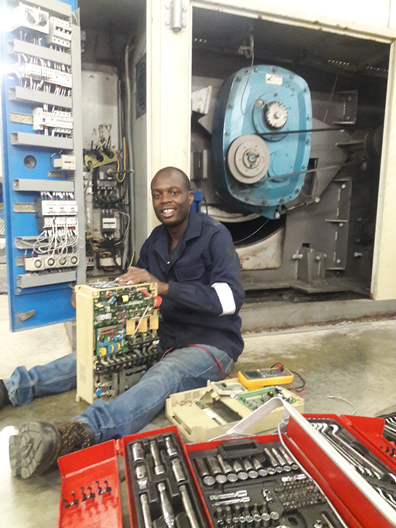
Tatenda Nherera is an EIT graduate, having obtained his Advanced Diploma of Electrical and Instrumentation (E&I) Engineering for Oil and Gas Facilities (DEI). He grew up in Gweru, Zimbabwe, but now lives in South Africa.
I asked him when the engineering bug bit. He believes it was when he was just 10 years old: he would pick through the components of faulty and abandoned radios and TVs, salvage selected parts and then repurpose them to create something else. He then took it a step further and began varying speeds on small DC motors – he became hooked!
He completed his Ordinary Level in 2006. After that, in 2008, he enrolled at Gweru Polytechnic College as an Electrical Power student. He excelled in all six of his subjects - most of all, in mathematics and science. He became an intern at Cargill Cotton Company, at their Ginnery, and continued to tinker with circuits, designing them for different scenarios.
At an agricultural expo in 2009, Tatenda showed off a traffic light system that he had designed and built. He received first prize in the Science and Technology section. It was awarded by the Deputy Prime Minister and a Professor of Robotics, Arthur Mutambara.
In 2015 he enrolled at the Engineering Institute of Technology (EIT) which allowed him to continue working while he studied. He says:
“Through EIT’s cutting edge presentation and delivery of materials and labs my maintenance, diagnostic and fault finding approach significantly improved. My improved technical report writing skills helped a lot in conveying necessary messages through motivations, recommendations and methodologies which were found to be technically sound and informative.”
Apart from his involvement in a range of projects in mining, textile and food industries, Tatenda works for Blue Aqua Projects, a Facilities Management Company with vast experience in water care facilities, laundry, kitchen, steam reticulation equipment. It is contracted by the Eastern Cape Department of Health to service, repair, maintain and install equipment. He uses his expertise in electrical and instrumentation engineering to service, maintain and repair key industrial scale laundry and kitchen machinery in a number of cities in the province, including Port Elizabeth, East London, Mthatha and Butterworth.
Tatenda believes that improving efficiencies in industrial laundry and kitchen equipment is of vital importance to a range of businesses (apart from health facilities) around the world. Tatenda comments that technological advancements are occurring at a rapid pace:
"New control and drive systems are being introduced to old and discontinued laundry machines. This approach moved the Eastern Cape health system to another level. The PLC (Programmable Logic Controllers) controlled systems, blended with HMIs (Human Machine Interfaces), brought another ergonomic feel to operators, it has enhanced production and saves energy. Old gearboxes and extra-big motors - with multiple motor drives for different speeds and torque - have been substituted with variable speed drives and better-sized single motors, to very good effect.”
Candidate Technician
Tatenda received his DEI qualification, an Australian accredited qualification, from EIT in October 2017. He filed an application with the Engineering Council of South Africa (ECSA) to be professionally recognized in South Africa.
After some time, despite not having a South African Qualifications Authority (SAQA) certificate, the positive news eventually came. ECSA recognized him as a Candidate Technician. This showed that, together with his work experience, EIT’s online qualification was the vehicle which gained him South African status within engineering. It was particularly stressful for Tatenda. He explains:
“I never thought a positive outcome was going to be obtained from this submission, considering that I made this application without a SAQA certificate. (It is normal practice that all foreign qualifications to be channeled through SAQA - for evaluation and grading - before other South African organizations/bodies consider and accept them). I got my SAQA outcome a month after receiving ECSA certification.”
Tatenda says that studying through EIT provided him with a wide network of students and lecturers from all over the world. He notes that attending classes from anywhere was a pleasure - he could take a break as needed and could even learn from his bedroom.
To strengthen his skills further, says Tatenda, he is currently studying a Bachelor of Science in Industrial Automation through EIT.
“I will remain employed and still study part time as I did on my previous course. The studies are giving me more meaningful skills, and contributing to the African society, where Engineering skills like mine are very scarce.”
- Details
- Written by: Quintus Potgieter
Ebenezer Opoku-Yeboah is an engineering enthusiast working in the mining industry. He is a registered engineering superintendent with Ghana Chamber of Mines. He obtained his sectional engineers certification in April 2011, but has twenty years of experience in both mobile and fixed plants, specifically focusing on maintenance and installation works.
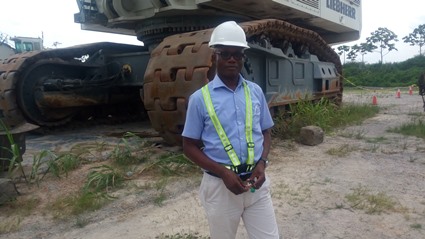 He is presently employed by Gold Field Ghana Tarkwa as Chief Engineer and is presiding over Maintenance and Projects. He has been with them for six years.
He is presently employed by Gold Field Ghana Tarkwa as Chief Engineer and is presiding over Maintenance and Projects. He has been with them for six years.
- Details
- Written by: Ruth Kennedy
Bruce Scallan is a Facilities Manager at Reutech Communications. The company specialises in technologically advanced secure military communications systems. In South Africa, Reutech’s parent company, Reunert Limited (a Johannesburg Stock Exchange listed company) has been a key supplier of equipment to the South African National Defence Force for 47 years. 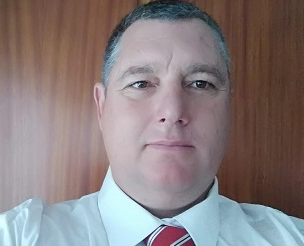
Scallan has four core responsibilities as the Facilities Manager:
● Management of plant maintenance, utilities, and support services.
● Management of security
● Management of the health and safety program.
● Management of the environment program.
Managing the facility is no easy feat. Scallan is involved from the ground-level of the organization right up to the executive level. He is involved with reporting, projects, financial planning, and risk management.
One aspect of his work that he finds particularly interesting involves the Environment Test Chambers – they are responsible for the thermal cycling tests on the military-tier radios.
Scallan’s focus is on the refrigeration systems of the Environment Test Chambers. The thermal cycling tests perform temperature “shock testing” on the radios, exposing them to alternating temperatures. He is currently designing a new test chamber for Reutech Communications for the purpose of testing their high frequency radios.
“I mainly use two stage cascade systems which produce ultra-low temperatures from around minus 40 to minus 85 degrees Celsius. These systems are two stage refrigeration systems each running on different refrigerants and are inter-thermodynamically linked. Therefore, we can cascade down to lower the temperatures.”

New technologies entering the market, Scallan says, are aimed at lowering the impact on the environment, with global warming in mind. And an added benefit with the newer technology is that it runs with more energy efficiency. Another challenge is changing operations to utilize more natural refrigerants – a better scenario for the environment.
Vocational training
Bruce Scallan has a desire to impart his knowledge to the next generation of engineering professionals. After completing his Professional Certificate of HVAC at the Engineering Institute of Technology (EIT) he was inspired. He began to dream of opening a technical vocational training center of his own. He explains:
“The training center will offer vocational training for students wanting to begin a career in refrigeration and air-conditioning, or will offer current apprentices and technicians the opportunity to improve their skill sets in the field. I feel strongly that vocational training can play a very important role in the education sector by providing tangible skills in the workplace that can be used from the word go.”
He is particularly passionate about growing this venture in South Africa. He feels that training institutions in his country often lack the resources to produce large numbers of skilled graduates. He is an ardent supporter of vocational training believing it builds relevant skills which are immediately useful in the workplace.
Cognizant of the demanding schedules of technicians and engineers who are actively working, Scallan believes he needs to model his training center around the principles of online education. He would like to provide people with the opportunity to become skilled, or indeed broaden existing skills, whilst working. He knows this is challenging, but also realizes that it is nigh impossible for most people to forego work and their salaries while they study and up-skill.
In fact Bruce is all too familiar with this juggling act! Having completed the part time, online HVAC Professional Certificate, he enrolled in EIT’s Advanced Diploma in Plant Engineering and their Professional Certificate of Project Management. He is completing these programs while working full time and raising a young family.
He says this about EIT’s approach to online learning:
“I strongly believe EIT’s learning model is going to revolutionize and pioneer the way Engineering can be taught around the world. EIT uses a very user-friendly and interactive system garnished with the best instructors around the globe to present the courses.”
And Bruce refuses to be daunted and is certainly not prepared to rest on his laurels: he has every intention of enrolling in EIT’s Bachelor of Science in Mechanical Engineering, after which he looks forward to acquiring a Master Degree.
- Details
- Written by: Sharne
2017 EIT Outstanding Student Award Runner-up
Course completed: DIT08 Advanced Diploma of Industrial Data Communications, Networking & IT
Date of completion: November 2017
I had always worked in managerial administration role until four years ago when I applied for a Communications Paraprofessional Apprenticeship/Traineeship. As of this week, I have completed Communications Apprentice/Trainee within the Townsville Communications team. As a Communications Paraprofessional, my role includes installation, testing, maintenance, repairs and commissioning of communications equipment on the Ergon Energy and Powerlink networks such as radio, SCADA, multiplexing, optical fibre, radio, IP in Ergon Energy and Powerlink substations and assets.
Personally, my husband and I are involved with bull riding and team roping (rodeo disciplines) and we both enjoy camping, holidaying, water skiing and snow boarding.
Experience at EIT
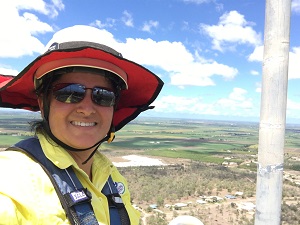 As part of my apprenticeship, I completed an Advanced Diploma in Communications, Networking and IT with EIT. For the most part, the content in the course was applicable to the work I do which made the course more valuable to me.
As part of my apprenticeship, I completed an Advanced Diploma in Communications, Networking and IT with EIT. For the most part, the content in the course was applicable to the work I do which made the course more valuable to me.
There were challenges with working full time, working remotely (with little internet access), home commitments and running out of time for assessments but our Learning Support Officer was very flexible, supportive and understanding of our needs. I was fortunate to do this course at the same time as a few of my colleagues so we provided additional support to each other even though they were based in different locations.
The Moodle site provided a one-stop space where we were able to access all the information we needed including the webinars.
The lecturers were knowledgeable in their fields. The stand out lecturer for me was Brian Hobby. Brian was extremely helpful, responded to queries quickly and always gave constructive feedback and direction.
I was completing my apprenticeship while studying my Advanced Diploma with EIT. I was able to apply the information I learnt while studying to my everyday work and this education helped me to understand the systems that I was working on. We are increasingly working with IP systems and the modules that covered in this area helped me in understanding how the systems I work on operate.
EIT in the workplace
In terms of career advancement, I believe my overall score of 96.52% contributed to me being successful in securing a full time position with the group I’ve been working with during my apprenticeship.
Recently I was offered a full time position as a Communications Paraprofessional with Ergon Energy so over the next 5 years I will be applying my education from my diploma to our protection systems, SCADA, IP systems and radio network. As technology evolves so quickly, I will be in a role where I will be constantly learning and training in new things. In terms of education, in the future I would like to complete more study in the field of electrical and engineering. As for my career, I look forward to a long and rewarding career with Ergon Energy.

- Details
- Written by: Sharne
2017 EIT Outstanding Student Award Runner-up
Courses completed: Advanced Diploma in Industrial Communications, Networking and IT
Date of completion: October 2017
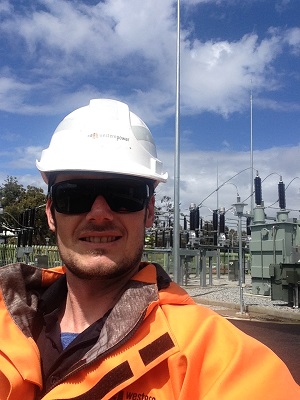
My experience with EIT has been fantastic hence why I decided to complete two Advanced Diplomas. These courses are well suited for people who work full time and are working in simular fields. The Lecturers have industry experience and are up to date with current trends in the industry with practical knowledge.
The learning experience was able to fit into my busy lifestyle allowing me to study at home with 24-hour access to remote labs without having to attend physical classes. All of the students in my class were from a similar background so we were able to relate to one another.
These courses have improved my knowledge at work helping me understand specific areas related to my industry. This has lead me in receiving two promotions in a four-year period. My understanding of the OSI model, TCP/IP and wireless technologies are a few examples of areas, which have led to my career success.
I have no plans of changing careers at this stage but wish start a Bachelor of Science in Electrical Engineering to further enhance my skill set at work and also opening up other opportunities that may arise in the future.
- Details
- Written by: Sharne
2017 EIT Outstanding Student Award Runner-up
Courses completed: Advanced Diploma of Applied Electrical Engineering DE22
Date of completion: October 2017
I am a trade & advanced diploma qualified electrical commissioning specialist, with extensive knowledge & skills in high voltage power distribution systems & possessing valuable experience in the oil & gas industry within Australia & overseas.
I am incredibly driven, a forward thinker, loyal and highly skilled, I have more than 10 years’ experience, as a trade qualified electrical technician in which I have been able to rapidly advance my career in the oil and gas sector. I’m greatly appreciative of the exceptional experiences I had so far in my professional career.
Experience at EIT
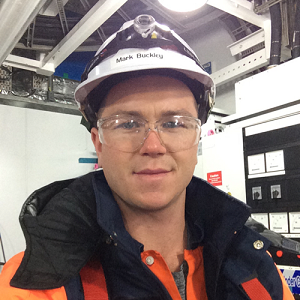 My study experience at EIT was extremely positive. I was initially apprehensive to enrol with EIT as I was concerned that I would overload myself as I had just been given a job promotion an about to enter into a very busy period at work. I was able to over come my apprehensiveness due to some encouragement from a work colleague. I am now extremely grateful that he gave me the push I needed.
My study experience at EIT was extremely positive. I was initially apprehensive to enrol with EIT as I was concerned that I would overload myself as I had just been given a job promotion an about to enter into a very busy period at work. I was able to over come my apprehensiveness due to some encouragement from a work colleague. I am now extremely grateful that he gave me the push I needed.
I found that I was able to keep ahead of my studies and gain good marks on my assignment by being very structured and organised with my studies. I work on an offshore gas platform which meant that I would be home for 3 weeks at a time with plenty of spare time and then away for 3 weeks at work where I would be very busy. I tried to do the majority of my study during the day whilst at home and then less while I was away at work. Small things that were able to help me to be organised was I would download all the module content to my laptop and file the documents in structured folders as well as keep a study diary to schedule and plan the work I needed to do for the course.
The online format delivery of the course was tremendous, and the course content such as the slides and the readings allowed me to keep a well structured source of information that I was able to learn from then continue to refer back to when needing information not only for my course but for my day job as well.
I found the access to many software programs via the remote labs very useful, which saved me from having to download programs onto my own computer. My Learning Support Officer was very diligent in her efforts especially early on in the course when students were getting to know the structure.
I was extremely lucky with the group I was put in for the group assignment, we were all likeminded and dedicated to getting good marks. When I received my Module 3 results it was probably my highlight of the course as it covered a lot of new things that I hadn’t seen before around project management which in turn improved my leadership skills and understanding of management decisions made in my workplace. But due to that reason the study required for the fundamentals of engineering (module 3) was also probably biggest challenge.
I found all the instructors very informative but none of them stuck out as being better than the others or worse for that matter. But to be honest I found that I benefited mostly when I was learning things by myself with the readings, my laptop and assignments and then being able to refer to my work experience to put the theoretical knowledge in a practical context.
EIT in the workplace
Due to the EIT course I am now more well rounded in my technical ability. I feel with the course and my work experience I have been able to built a great base of knowledge around the electrical industry in which now I hope to add to that with new work challenges.
My strength in my job is my technical ability and being able to advise others where needed. There have often been times where I’ve being able to advise colleges better because I’ve been able to draw from the knowledge I’ve gained from this course.
This has allowed me to excel in a new role at work where initially I was potentially out of my depth but now feel not only confident in the new role but proud of how I’ve developed. My progress has been due to a combination of the experienced I’ve gained in the role and the completion of the EIT course.
Rhys Morgan – Lead Electrical Engineer Wheatstone Platform
“Mark’s technical ability has developed along a steep learning curve since he took the role of lead electrical technician which has coensided with his electrical engineering studies. His ability to carry out technical tasks and advise his work mates on technical issues is a strength of his, and I have no doubt this has improved due to his commitment to his studies”.
Training and career goals for the next 5 years...
My career goals are very clear; firstly, gain employment as a technical expert with a major global oil and gas company and secondly to develop my technical ability through my on the job experience.
As far as formal training goes my ambition to pursue a bachelor of science is very strong and I’m hoping that I can secure a long term position within the oil and gas industry which is also conducive to my study efforts so I can then enrol.
- Details
- Written by: Sharne
2017 EIT Outstanding Student Award Runner-up
Courses completed:
- MIA01 - Master of Engineering
- GPI01 - Graduate of Diploma in Project Management.
- DIA01 - Advanced Diploma
- Certificate Process Control
- Certificate Instrumentation
- Certificate Technical writing
Date of completion: Completed Master of Engineering in April 2017
I was born and raised in South India in the village of Pariyanvayal. From an early age, I was involved in academic and sporting pursuits with science being my favourite subject. My interest in science led me to follow a career in Engineering, specializing in Electrical and Electronics Engineering. I began my Engineering Diploma in April 1993 and completed it in April 1996. My first employment was with KCP Limited in India. I was one of three successful candidates from over 100 student applicants. I’ve continued working in Instrumentation and controls as a Supervisor / Engineer and gained extensive experience in the fields such as design, programming and commissioning. In 2005 I moved to Australia and started my career as an instrument Technician.
Experience at EIT
My experience with EIT/IDC has given me a chance to expand my skills in the field of instrumentation and process controls. From past experience and future opportunities, I am certain there will be many opportunities to learn and advance my career which I am truly thankful for.
Loop tuning/Process Control:
Mr Rodney Jacob at IDC loop tuning course taught me many tips and rules that I was unaware even existed, and would still be unaware of had it not been a part of my experience. Because of this, I realized I still had a lot to learn despite what I thought I knew. This has allowed me to improve my skills even further as I continue to attend EIT courses giving me the confidence in field of process control and automation.
Technical Writing:
Other great experiences with EIT, particularly in the technical writing program, has allowed me to gain further knowledge about a variety of technical writing skills and reports. This course allowed me to become competent with my technical writing ability. I’ve written various technical documents from functional descriptions to technical specification for Ammonium nitrate and GLNG projects. Without the technical writing course MIA01, it would not have been possible and I will always be thankful to Mr John Piperides for this.
DIA01: Advanced Diploma
I am proud to say that I was one of the first students to complete this course. A big achievement for me was furthering my skills and my learnings in Safety Instrumentation and Emergency Shutdown Systems for Process Industries Using IEC 61511 and IEC 61508 during this course. This course material was well designed and easy to understand to explain the standards to all the students. We were very lucky have Dave Macdonald for this topic.
I would also like to take this opportunity to personally thank Erin Gill, the course co-ordinator as she was very responsive and always very proactive in helping us.
GPI01: Graduate Diploma in Project Management
Again, I was fortunate to be one of the first students to complete this course. After completing this course I’ve taken on roles as lead ICSS engineer for Santos GLNG project. I’ve also had the privilege of spending almost two years in Houston Texas at the EPCM contractor’s office to supervise the EPCM teams and activities such as design reviews and approvals. All the modules in the course allowed me to reach a new level in the PMT field.
MIA01: Master of Engineering
I am very proud to have been one of the pioneers and batch of the first successful students to complete this course. This course was a huge challenge for me personally. As mentioned before that, without the technical writing course skills and completion of MIA01 it would not have been possible. I was almost about to give up until Natalie Holland and Robert Holm provided me the relentless support to complete the course.
In summary, my time with EIT has enriched my life in many ways. It’s provided me with the necessary tools to enhance my technical skills even further, taught me valuable information about this diverse world and people and concepts in general and eventually will allow me to hopefully become even more successful in my working life once I’ve finally graduated with my master degree.
EIT in the workplace
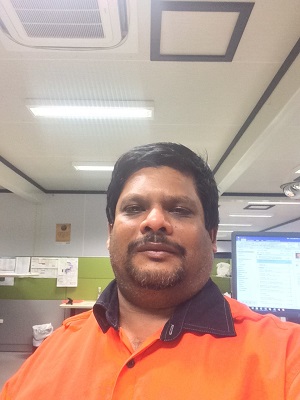 In 2005 I moved to Australia and started my career as an Instrument Technician. As part of my career development I decided to update my qualifications. My first course in Australia was the Instrumentation, automation and process control with IDC. Completion of this valuable certificate course took me to the next level as a commissioning controls system engineer for the Alcan Gove G3 project. During this project commissioning I gradually got involved in the process control world and had taken another IDC course in process control and loop tuning to expand understanding about the process control.
In 2005 I moved to Australia and started my career as an Instrument Technician. As part of my career development I decided to update my qualifications. My first course in Australia was the Instrumentation, automation and process control with IDC. Completion of this valuable certificate course took me to the next level as a commissioning controls system engineer for the Alcan Gove G3 project. During this project commissioning I gradually got involved in the process control world and had taken another IDC course in process control and loop tuning to expand understanding about the process control.
I’ve continued working in Instrumentation and controls space as an Engineer and gained extensive experience in this field including Design, Programming and Commissioning. This included hands on experience as a Control Systems Engineer / Process Control Engineer and Functional Safety Systems Engineer. It has allowed me to work various major DCS systems such as: Siemens (S5, S7-200, S7-300, S7-400), Emerson (Delta V DCS), Rockwell (Micrologix, SLC, Contrologix etc), GE Fanuc (90-30), HIMA Safety system, Triconex and Honeywell safety Manager. Through my work exposure I gained proficiency in communication protocols such as Serial (RS232/485), Control Net, Profibus, Modbus, Field foundation bus, HART, Data Highway and Modbus TCP/IP.
In conclusion, during my 20 years of experience in fields of Process Control Systems Engineering, I have commissioned a diversity of automation projects for multiple industries such as: Pulp and Paper, Oil and gas, Mining, Power, Water, and Petrochemicals in various locations all over the world. It has also allowed me to conduct the maintenance and modifications relevant to instrumentation as per the process requirements in numerous situations.
My work ethic ensures that I always strive to produce quality work and the best of my ability whether I’m working as part of a team or on my own. I’m always striving to maintain an open mind and am comfortable working under pressure to meet clients deadlines.
I have completed the following qualification namely: Advanced Diploma DIA01, Graduate Diploma GPI01 and MIA01 in Industrial Automation with IDC technology / Engineering Institute of Technology as part of furthering my career development to fulfil the educational gaps I was missing. This course was conducted by very experienced and qualified instructors/ Lecturers.
Training and career goals in the next 5 years...
With my recent Master degree from EIT, I believe it will allow me to reach the very top levels in the field of project management. As you can see I have developed from technician to lead engineer PMT. I can’t see any road blocks to becoming a senior project management member in the LNG industry with in the next 5 years.
- Details
- Written by: Sharne
2017 EIT Outstanding Student Award Runner-up
Course completed: Advanced Diploma of Electrical Engineering (Electrical System)
Date of completion: October 2017
My name is Jared Stone, and I’m employed at Western Power as a Primary Plant Technician, part of our Asset Management Business unit.
Having come on board originally as part of Western Power’s apprentice program in 2011, I successfully completed my training in a shorter timeframe than originally planned whilst also completing further studies during the same period.
After my apprenticeship I sought to begin further studies, and after commencing my degree in October of 2015 I’m proud to say I’ve successfully completed the studies.
I’m an automotive enthusiast, and enjoy playing drums with my band in my spare time.
Experience at EIT
The highlights of my experience whilst studying at EIT were namely flexibility and suitability.
I could tailor to suit me and my varying needs over the time of my course, which would’ve been incompatible with almost any other format of delivery. The flexibility of largely self-paced study and recorded webinars allowed me to work my study efforts into my schedule whilst still remaining within the full-time workforce and still able to pursue my personal passions.
What I found during my time was that the content broadly swept across many different specialties within industry, leading me to conduct further self-guided study when a topic of particular interest was raised such as high voltage testing, protection systems, or battery energy storage.
The use of 100% online technologies to deliver the content in multiple ways meant that sound communication channels were extremely important when the objective of an assessment wasn’t clear, or the content was beyond my understanding. It was at these points that being able to reach out to lecturers at my leisure and hear back from them in a timely manner was great, as it meant that touch of extra support or guidance was never far away at all times.

Aside from this conducting group work over multi-month projects was extremely challenging at times. As group members all worked for different employers, had different methods of available communication, and were even governed by different time zones!
Whilst this proved to be challenging, being able to lead my group project through its various stages, successfully submit assessments before deadlines, and produce great results thanks to excellent time management, teamwork, and communication was satisfying to look back on.
EIT in the workplace
Knowledge gained from the program is employed on an almost day-to-day basis in my current position with my employer. I’ve found myself calling on almost every part of the content covered during the degree, be it the various types of maintenance regimes, attributes of network assets, or planning and implementing process plans.
One particular point to note is that many parts of the knowledge gained during the course of the degree is now assisting me to be a part of the drive to sustainably reduce the cost of managing our network assets. Prior to the course I didn’t have a grasp of asset life cycle assessments, or why they were essential when considering design, procurement, installation, maintenance, and disposal of assets.
For example understanding trades-offs between capital cost of products and forecast maintenance requirements has allowed me to look beyond what I saw as ‘the way it is’ during my time in the field, and indeed forms part of initiatives to drive down overall business costs.
Aside from the technical knowledge, learning the fundamentals of professional engineering and project management during my time in the degree is proving to be of great use. Having learnt how to better collate information, communicate with others, and collaborate across differing professional backgrounds is allowing me to take in more diverse types of information, and consider many perspectives different to my own in the course of my work.
My successful completion of the course over time was eventually intrinsically linked to receiving an offer of a promotion within my company to my current position.
As my current team leader was made aware of the potential of me joining his team as a technician he pointed out that it was excellent to see I would still continue to study and develop my knowledge in a formal manner whilst taking up the role.
If it wasn’t for having been enrolled in the course and actively studying, it would’ve been far harder to prove to my management team that I had great potential to be a part of their local workforce, and contribute good work.
Colleague / Mentor Neil Kilcullen:
“Since I first met Jared as an apprentice he’s always shown great interest in going above and beyond what is required of him in his work and learning. During the time that he’s been studying at EIT I’ve seen him gain knowledge at such a rate and apply in ways that I now see him as less of a mentee and far more as a capable workmate in engineering roles that I am sure he’ll occupy in the future.
I look forward to seeing Jared continuing to seek out new opportunities that his education will now provide to him.”
Training and career goals for the next 5 years...
My overarching goal for 5 years and beyond is to continue to seek both on-the-job and off-the-job training to develop both my breadth of depth of skills and knowledge at a rate that helps me to add value to both my employer, and my community.
In my current role with my employer my goals are to learn the philosophies, strategies, and practices of asset management then successfully implement those learnings in my day-to-day work.
My training goals centre around diversifying my fields of knowledge and capabilities, namely in business and project management.
Having spent several years in the operational workforce initially as an Apprentice, and then as a tradesman performing technical work I’m now planning to pursue these diverse studies to become a flexible, multi-skilled member of the workforce.
Aside from my professional work I hope to continue carrying out activities and engagements as a public speaker and ambassador for youth mental health, and the learning that comes from these pursuits will continue to bolster my leadership skills in and out of the workplace.

- Details
- Written by: Sharne
2017 EIT Outstanding Student Award Runner-up
Course completed: Advanced Diploma of Industrial Automation
Date of completion: 25th September 2017 (DIA 22)
 I am Mr. Dominique Mutombo Hoyi, a Congolese (DR Congo) who is now living in South Africa (Johannesburg). I was born in Kinshasa (DR Congo) on the 15th October and did my Pre-primary and primary school there before my entire family moved to Mbuji-Mayi (Kasai Oriental Province, 1997). Then the family moved again from Mbuji-Mayi to Lubumbashi (Katanga province, 2003) due to some economic problems, and in Lubumbashi is where I did all my high school studies (2006).
I am Mr. Dominique Mutombo Hoyi, a Congolese (DR Congo) who is now living in South Africa (Johannesburg). I was born in Kinshasa (DR Congo) on the 15th October and did my Pre-primary and primary school there before my entire family moved to Mbuji-Mayi (Kasai Oriental Province, 1997). Then the family moved again from Mbuji-Mayi to Lubumbashi (Katanga province, 2003) due to some economic problems, and in Lubumbashi is where I did all my high school studies (2006).
Then from the 20th July 2007 I flew to South Africa for my University studies of which I had the opportunity to join Vaal University of Technology to do my National Diploma in Electrical Engineering (Heavy current) from January 2009 up to July 2012. After my National Diploma course completion, I was hired at TECMED Africa (LTD) as an X-rays Trainee Technicians for one year to complete my in-service training (WIL, Work integrated Learning) before the graduation.
Then from December 2012, I have joined AGE Technologies JHB as Learner Technician of which I have become a Project Technician then a Project Engineer after a lot of hard work and determination on my daily works and tasks.
My decision to apply at The Engineering Institute of Technology (EIT) for my Advanced Diploma in Industrial Automation (DIA 22) came after I started working for AGE Technologies (JHB) as a Project Engineer or a Control System Engineer. I realized that I was missing key information to apply to an application or project while working on a giving project or task, be it a simple or complex one.
Since Age Technologies (JHB) is an Integrated and Control System company dealing with process control and industrial automation, to work for a Control System company like this one or to become a good Process Control Engineer you need all industrial automation knowledge and information and these kinds of knowledges are available at a well-known, recognized and accredited Institute such as Engineering Institute of Technology (EIT).
Experience at EIT
What impressed me the most at EIT while I was doing my Advanced Diploma (DIA 22) are the course program, the structure of the course, the content of the course learning materials. The course programs are classified based on the engineering discipline, for example if you want to become an Electrical Engineer, you need to do the Advanced Diploma in the Electrical Engineering and if you want to be a Control System or a Process Control Engineer, you need to do the Advanced Diploma of Industrial Automation like me.
The structure of the course is planned in the hierarchy order such that the next module is the continuous of the previous module. This means if you did well on the previous module, the next one will not give you issues.
The information contain inside the course learning materials is helpful and very rich base on your engineering discipline (Industrial Automation, Process Instrumentation, Electrical Engineering, Civil Engineering and so on….). For myself, the course learning materials or manual information is helping me a lot during my current career and especially while I am working or writing my engineering (software) application for any of my given projects.
Talking about my course (DIA22) lecturers and Learning Support Officers, they were well organized and had a lot of experience in their specific engineering fields. They were skilful as well since they were using lifetime experience to explain about a topic of the subject, this method was helping the students to get a clear understanding of what the module is all about.
The remote class method used at this Institution was helpful to me in many aspects. Sometimes attending classes will require students to stop whatever they were doing and be at location (school building) at specific times and for some time. But with remote classes what I needed was just the internet connection regardless where I was located at that moment.. The technology used for me to communicate with my follow students was advanced and good.
Sometimes I had difficulties with my course while using the software to login, how to convert the GMT time to South African Time (Pretoria time), be on time on each remote class and the module assignments.
EIT in the workplace
The knowledge gained from EIT while doing my Advanced Diploma of Industrial Automation helped me a lot in many fields of my current career position (Project Engineer or Control System Engineer at AGE Technologies JHB).
This information helped me first how to differentiate the types of control system (ON/OFF Control, Continuous Control, Batch Control and Sequential Control System) I am working on at a period and how to react while working with any types of these control systems.
This information gain from EIT make me able to do the fault finding or to do the troubleshooting in any build control systems.
Since electrical service technicians and engineers of today must understand the communications problems that crop up in multilayered building control systems, the advent of electromechanical controls in the 1970s, analog controls in the 1980s, direct digital control (DDC) in the 1990s, and complete building control integration in the 2000s has progressively offered building owners and facility managers powerful new options for reducing energy costs and improving occupant comfort.
However, as these multiple generations of pneumatic, electromechanical, digital, and integrated controls are layered on top of each other, communications problems become much more difficult to identify and troubleshoot.
Integrated control systems facilitate smart manufacturing for your industrial automation solution. The knowledge gained from EIT while doing my Advanced Diploma of Industrial Automation enables me to deploy an industrial control system individually at a machine or line level to solve specific needs.
The knowledge gained from EIT while doing my Advanced Diploma helped me to improve my design skills while working with control systems, this knowledge is applied in these fields:
- Control System Devices Input Output Processing
- Input Control Devices: Input devices are used to sense a condition, detect movement or position, indicate a limit or set point has been reached, sense intervention by an operator, detect an alarm, etc. Typical input devices may include limit switches, photoelectric sensors, pushbuttons, proximity sensors, an operator interface, etc.
- Output Control Devices: Output devices are used to control actions such as motion, start/stop of equipment like conveyors and pumps, on/off control of valves, operator alerts/prompts, status indications, etc. Typical output devices include relays, motor starters, pilot lights, operator interface graphics and numeric display, etc.
- Processing Control Devices: All control systems can typically be defined as having inputs, outputs and some form of decision making going on in between so that outputs are controlled based on the status of the inputs. This brings us to our third category, the “decision making” element. The microprocessor used on the motherboard, along with its memory, the operating system, and the application program would serve as the decision-making element. As a matter of fact, PCs are used in some automated control systems as the decision-making element, together with industrial input and output (I/O) modules.
I have also applied the knowledge gained from EIT while doing my Advanced Diploma while optimizing, upgrading and commissioning the control systems (Mine systems, factory systems, etc…).
An example of this is when I was upgrading the plant called Kubili Recyclers (from Rockwell SLC 500, 5/04 CPU to SIEMENS TIA Portal V14, S1500 CPU).
My future vision in my current position is to become a great senior Process Control and Software Engineer, and then later, I can join the engineering management team within a well-known and organization.
The motivations in my current position are the senior Project Engineers whom I am working with since they can solve complex problems (Networking, Control and Power circuits within the industries (sites or plants).
Training and career goals for the next 5 years...
- First, to become a Process Control Engineer in life, you must be qualified. This means obtaining at least a Bachelor Degree in the field of Electrical Engineering (Process Control and Instrumentations). That is why I am pushing my engineering study as far as possible even to obtain a Master Degree if possible in Process Control (Industrial Automation then another one in Robotic).
- Secondly, a good Process Control Engineer is one that has more years of experience in the field of control systems. So far, I have five years of experiences in this field and I am still giving myself a chance to learn practical work as many times as I can while I am still working at my current employer (AGE Technologies JHB).
- .Thirdly in my future career, I would like to be a Great Process Control Engineer who conceives designs, complies, writes the control philosophy and the application (software) of a control system then perform the commissioning and the optimization of the entire project
- Details
- Written by: Evangeline Newby
2017 EIT Outstanding Student Award WINNER
Courses completed:
- Adv Diploma in Electrical Engineering (DEE22) – Sept 2017
- Certificate of Competency in Power System Protection (CPS05) – November 2016
- Certificate of Competency in IEC61850 based Substation Automation (CSZ02) – Sept 2016
"I am a 46 year old electrical technician from Durban, South Africa.I have been in the electrical transmission/distribution sector for 25 years – the last 18 of which have been as a self employed commissioning engineer and protection specialist.
"The company which I founded in 1999 has been involved both nationally and internationally in the installation and commissioning of primary and secondary equipment in substations, power stations and industrial installations up to 275kV level.
"I have also been the lead commissioning engineer on more than 30 IEC61850 based substation projects over the past 10 years.During this time I mentored 12 young students whilst providing them with an opportunity to complete the experiential part of their local Diploma courses.
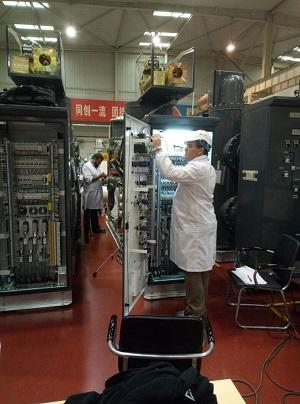
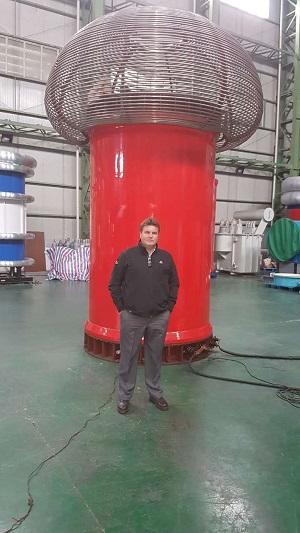
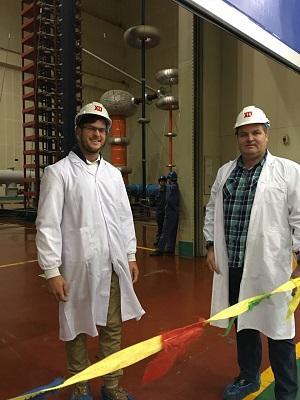
Left – Undertaking Factory Acceptance Testing (FAT) on clients 145kV GIS – Xian – China – January 2017.
Right – Visiting HV Test Equipment Supplier – YangZhou – China – April 2017.
Visiting an HV Test Facility – Xian – China – January 2017
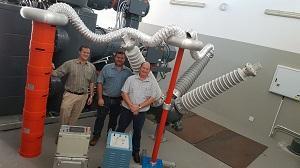
I imported and sold this Resonant Frequency HV test equipment to a client in South Africa.This was the first use of the equipment on a 145kV GIS switchboard which was tested at 235kV.
Experience at EIT:
I decided to read for the Adv Diploma in Applied Electrical Engineering (DEE22) to add some international flavour to the academic section of my CV to complement the impressive and extensive experiential aspects. At the time, I had researched many different avenues to continue with my studies and EIT seemed to be the best value for money solution as well as having a flexible program which was internationally recognised.
As it turned out, the EIT experience was perfect for me as I am extremely busy during the week both during the days on site and the evenings compiling test documentation, drawings etc and the pace and flexibility of the program allowed me to study whilst not interfering with my business commitments.
The online facilities were a pleasure to work with, the lecturers were extremely knowlegable and committed to the teaching/learning process by making themselves available outside of formal sessions to answer questions on the coursework and to engage on matters relating to engineering in general. On the admin side, the course co-ordinator was always available and willing to assist with queries. Moodle was also an excellent tool which served as a platform for all course related content, news, instructions, announcements, results etc. It was my experience that EIT have really hit the mark and set the benchmark for online learning due to
The highlight of the course was also the most challenging – that being the FPE module where we worked in groups to deliver a fictitious rural renewable energy project. What was significant was that the group was spread over 4 continents and many different time zones, yet by using technology were able to co-operate and deliver a solid outcome. Whilst is was challenging, it was a highlight for me because it was a stark demonstration that IT technology has made the world a very small place, and that online collaboration and sharing of ideas can deliver positive outcomes without the need to travel for face-to-face meetings.
Very early in the course, I created a Facebook Group for the class to share news, problems and to raise issues outside of the formal classroom. This proved to be very popular which many of the students registering in the group and making contributions.
Whilst busy on the 18 month Advanced Diploma course, I also managed to complete 2 certificate courses in Power System Protection and IEC 61850 based Substation Automation. Whilst I have expert knowledge in both of these subjects, it is rewarding to now have formal recognition to go with my knowledge and experience. I managed to score 97% and 99% respectively for these 2 courses. My results were also most pleasing in the Adv Diploma course – I am expecting a total course mark in the mid to high 90’s.
EIT in the workplace:
In terms of employability and professional status, my EIT Advanced Diploma in Electrical Engineering has enhanced my status and profile as a commissioning engineer. I have found that I am taken much more seriously now that I have a solid academic qualification behind me to complement my experience. I hope that this will lead to some form of professional recognition which will further enhance my credentials in the industry. I will be investigating this avenue when I arrive in the UK at the end of 2017. I hope to attract a larger range of clients with the enhanced reputation that the EIT Advanced Diploma will bring.
In terms of technical knowledge, to be completely honest, the EIT Advanced Diploma did not extend my technical knowledge much further in the fields which I have worked in for the past 20+ years. This is probably to be expected since the vast amount of knowledge accumulated in a real-world environment accompanied by self-study, cannot hope to be surmounted by an academic course at this level. I felt totally in control of the technical content in the various modules and was often able to offer greater insight into technical matters that some of the course presenters.
There were however some modules where I learned a great deal of technical knowledge, mostly in fields such as power electronics, variable speed drives and energy efficiency which are areas not common to me in my daily work.
The areas where my EIT Advanced Diploma Studies helped tremendously were in the non-technical areas. As a business owner, I learned a great deal about financial, legal and human resource matters in the highly enjoyable FPE module.
I am emigrating to the UK at the end of 2017 where I hope to establish myself as a freelance commissioning engineer in the transmission, distribution and power generation sectors. My aim is to be accredited as a National Grid Commissioning Engineer (TP141 certification) to enabled me to assume lead commissioning engineer roles on 400kV transmission projects.
Training and career goals for the next 5 years...
Short term (1 year)
- In 2018, I want to complete the Graduate Certificate of Renewable Energy with EIT. The renewable Energy sector is an obvious area in which to extend myself as a commissioning engineer. The GCRE will allow me to have the additional knowledge necessary to apply my commissioning experience in these fields.
Medium term (3-5 years)
- Within the next 3-5 years I would like to have established myself as a commissioning engineer in the UK and have proved my competency in the large scale solar and wind energy space. I would also like to have gained my TP141 accreditation.
Long term (5+ years)
- I am also considering the EIT degree courses, but may opt for a mechanical or process control option to extend my knowledge in other areas as I believe I have a well established knowledge base in the electrical discipline.
- Details
- Written by: Sharne
2017 EIT Outstanding Student Award Winner Runner-up
Course completed: DIA22 Advanced Diploma of Industrial Automation
Date of completion: 25 September 2017
Sales Engineer at Endress+Hauser
We strive to generate outstanding value for our Customers. Endress+Hauser are a number one leader in the Instrumentation, Solutions and Service Industry globally. My Professional background started in 1989 starting my Electrical Apprenticeship for three years continuing with another two years for the Nampak Group. My passion and interests were always in sales, and therefore decided that I needed a change and have since worked as a consultant. Some of my achievements were being Sales Person of the year, and being third place overall within the Endress+Hauser International Group for the sales development progress awarded in Hannover, Germany.
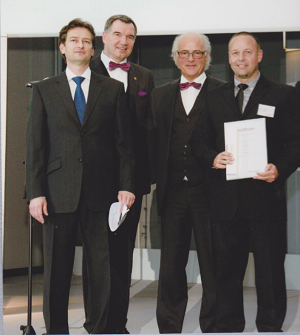
Experience at EIT:
The key to success for an online course is accessibility. I found the course very user friendly and had good supportive and informational structures. The scheduling, readings, slides, videos, software downloads and links all were very helpful and everything was explained step by step. It was most of the time easy to access, but the only issues which I can add that made it sometimes difficult and time consuming was Encryptions on my computer and the ADSL line not always being 100% reliable. The course was quite specific. The course content was great and spot on with my day to day work in the Industry.
The Lecturers were very professional; they were friendly and explained everything in detail asking a lot of questions. I especially found Mr Deon Reynders precise in what he did, explaining in detail and making it very easy to understand, also very helpful and direct. Learning remotely for me was great, and I was able to schedule and do things in my own time. It was also great to plan your schedules and learning without any disturbances. To be honest, Paul Celenza, the course co-ordinator was very good. He was very supportive, helpful and very quick to respond to questions, he made us aware of what was happening and when and what to do at all times.
The technology was very interesting and very up to date with the Labs, software downloads, links and videos. Interactions with fellow students were at times a bit challenging, as meetings had to be scheduled with people at different locations and different work times. At the end we did manage and learned a lot about each other, and communicated as most as possible. There were some misunderstandings at times. Some of my highlights were to set goals and try achieving better grades every time. I found working through the reading material slides etc. and attending the online classes with the Labs very interesting and very user friendly. The only challenges were sometimes, finding time through working, putting your social life aside. Also as I mentioned with the encryptions on my computer which did not always make it easy to download software or to open links took sometimes a lot of time to try and correct. The ADSL line also was not working so great at all the times with bad connections, but other than that I enjoyed the course and got through it. I will still be looking for new courses online.
EIT in the workplace:
- The modules were very interesting, learning from the older technology to the most modern.
- It covered a wide variety which all can be used in my workplace.
- All modules were very up to date with all the environmental, safety, new technology what is currently happening in the world today.
- Everything to better processes, life, economy, safety aspects etc. to look after our world and make it a better place for everyone.
- To be aware of all the dangers and doing Hazops in the industry.
- The knowledge I gained will help me a lot in my workplace.
- It covered a lot and made me more aware when going out to different industries and plants.
- I can include most of it in my day to day work, the networking, wireless systems, Hazops, safety, projects.
- The Ethics in the workplace, how and what to look for and do in meetings.
- How to be a good Leader, attitude etc.
- As I cover most of the Industries the course definitely help a lot and created great awareness.
- Will definitely look at some other courses available at EIT.
Training and career goals for the next 5 years...
Short term (one year):
- To start a business Management or Leadership course.
- Achieve a higher grade at work for example from a C5 to a D1.
- Start a Networking/IT Business Driver development plan.
Medium term (2-5 years):
- To be in a Management position.
- Completed a Business/Marketing Management Diploma/Certificate
Long Time (5 years+):
- To be in a Management Position.
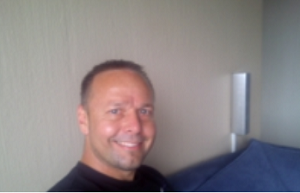
- Details
- Written by: Sharne
2017 EIT Outstanding Student Award Runner-up
Course completed: Advanced Diploma in Automation Engineering (DIA22)
Date of completion: September 2017
"I have over 10 years working experience on machinery and automated plants as a Maintenance Technician and have been in the job market a few years ago. I have learnt that experience without qualifications only opens a few doors with lower income.
Given my aspirations for more opportunities and higher income, I completed my Electrician trade in 2016 and shortly after began the Advanced Diploma in Automation Engineering. Education has not only broadened my mindset but will open doors to a better career and income potential.
I look forward to the future and plan to start a Degree program as soon as possible.
The course content was in depth and helped with my everyday work. I enjoyed the variety of content but would have liked more electronics.
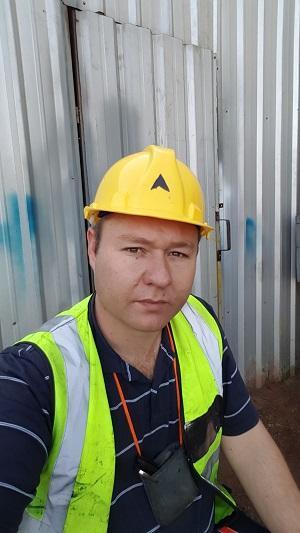
"Online lectures by experienced professionals in their field helped bring the content to life by sharing their personal experiences and being able to watch recordings of lectures was definitely a bonus that I frequently used.
Lecturers responded to my queries in good time and were happy to explain in more detail when asked.
Working in an automated facility and having no one with engineering experience to learn from, I found myself becoming more knowledgeable through this course and lectures experience. Better understanding how the automated systems and instrumentation work has enabled me to not only trouble shoot these systems with confidence but recommend and install new system additions.
"On receiving my Diploma I plan to apply for and move from a maintenance technician role to purely electrical and automation roles within a system integrator or a facility where I can gain experience from accomplished engineers. Following this move and gaining valuable experience I wish to move up to a supervisory position.
I hope to follow my career move by completing a wireman’s license and a few short professional certificate courses specific to Siemens, Allen Bradley or Mitsubishi then begin a BSc course in Automation engineering."
- Details
- Written by: Quintus Potgieter
While Darryl Morrison is currently a Detail Draughtsman in the bulk materials handling industry, he has his eye on becoming a professional engineer.
I asked him what he did for Rula Bulk Materials Handling:
“We design and detail bulk material handling plants from concept to commissioning. I ensure that the designs I receive from the engineers are made into shop drawings so that the various workshops can fabricate the structural steelwork, machine mechanical components, process piping, and bend rebar.”
He mentioned that he loves seeing his drawings come to life on site.
Darryl’s first job was as a Production Plant Operator for Western Platinum Refinery (WPR). It was here that he learned about processing platinum group metals (PGMs) and acquired skills in control instrumentation.
He worked in the Primary Separations Department which installed its first plant that was 90% automated – this meant putting a lot of faith in the instruments on-site when working in the control room! During his time here he managed to study part time, earning his Engineering Draughting Diploma.
With this diploma he started with a civil and structural consultancy company named HBS AFRICA. Here Darryl learned about industrial structural steelwork and construction management.
He then moved on to one of the world’s leading engineering professional services firms, WSP. He worked as a draughtsman within the Industrial Division (specializing in electrical and mechanical engineering).
At WSP Mr Geoff Carter became Darryl’s mentor. He was able to explain how the disciplines of engineering plug into the WSP Industrial Division and at the same time Carter inspired him to pursue his ambition to become an engineer.
During his part-time work for IGEZI Electrical Contractors he became an accredited electrician and in a similar vein completed the Advanced Diploma in Electrical Engineering with the Engineering Institute of Technology (EIT).
He is currently enrolled on a Bachelor of Science Degree (Electrical Engineering), also through EIT.
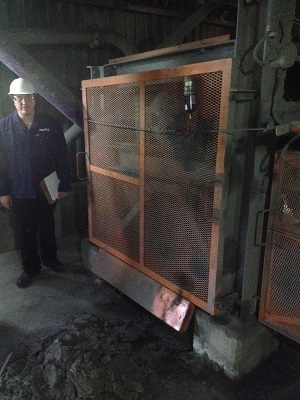 That other job
That other job
As a new father Darryl is reading Dad Book, by South African author Craig Wilkinson; he recommends it for anyone facing fatherhood.
With a child to consider and plan for Darryl reflected on what Secondary School Scholars/Young Adults should study in the future:
“I would highly recommend that young adults study towards a career in the STEM industry. I think a lot of youngsters tend to worry about the Mathematics component. Mathematics is only one portion of engineering. The STEM industry is a vast and rewarding industry. There will come a time when a new generation of youngsters comes through the ranks. I hope that I can transfer the knowledge which I have gained over the years to the next generation.”
Finally, Darryl summarizes that a combination of hands-on experience, good mentors and excellent qualifications (through institutions which facilitate life-long learning), make the possibilities endless.
- Details
- Written by: Quintus Potgieter
Andrew Grant (46) is an International Specialist Electrical Contractor, a business owner and a commissioning engineer. Despite these successes he was looking to remain relevant in our ever-changing world; he recently graduated with an Advanced Diploma of Applied Electrical Engineering. His studied through the Engineering Institute of Technology (EIT) and has now won the EIT Outstanding Student of the Year award for 2017.
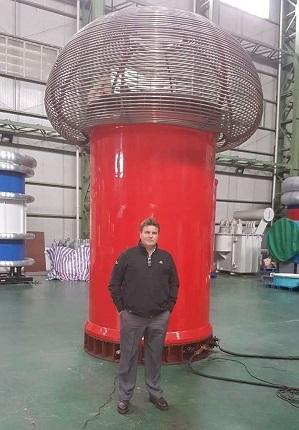
Andrew has been involved in the electrical transmission and distribution sector for more than 25 years. For the past 16 years he has been running his own company, AMG Power Systems, which he founded in 1999.
AMG Power Systems is based in Durban, South Africa; it specializes in the installation and commissioning of primary and secondary equipment in substations, power stations and in industry.
Andrew’s daily responsibilities involve working with equipment such as switchgear, transformers, instrument transformers, GIS, protection and control equipment, SCADA networks, batteries and charger systems.
He says the electrical industry, specifically in the heavy current field, is facing a shortage of qualified and competent people. He asserts that the industry needs people to design, commission, operate and maintain power networks in the near future. And those students need to be aptly trained to do so.
Balancing work and study
Andrew was looking for a solution to the conundrum of running a demanding business and needing to upskill at the same time. He said:
“As it turned out, the EIT experience was perfect for me as I am extremely busy during the week both during the days on site and the evenings, compiling test documentation, drawings, etc and the pace and flexibility of the program allowed me to study whilst not interfering with my business commitments.”
Incredibly, Andrew also completed 2 online certificate courses, each 3 months in duration, through EIT during his 18 month Advanced Diploma course. He finished the Power System Protection and IEC 61850 based Substation Automation courses successfully.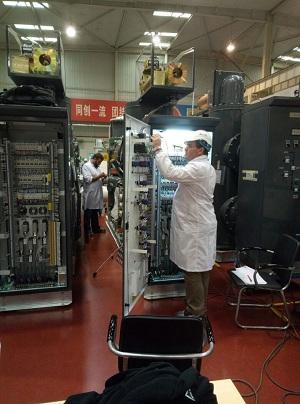
Andrew believes that the qualification, together with the professional development courses, contributed to his increasing self-confidence in his business. The international standing of the qualification (it is recognized under the Dublin Accord) was an added benefit as he intends to immigrate to the United Kingdom.
Andrew is looking ahead and to the future of the industry: in 2018 he intends to enroll on EIT’s Graduate Certificate of Renewable Energy (GCRE) and further himself as a commissioning engineer in the UK with proficiency in large scale solar and wind energy technologies. He says:
“The Renewable Energy Sector is an obvious area in which to extend myself as a commissioning engineer. The GCRE will allow me to have the additional knowledge necessary to apply my commissioning experience in these fields.”
When reflecting on his online studies he tells of something he initiated which helped unite his virtual class: a Facebook group. It proved popular as the students in his cohort were able to share news, consider problems and raise issues outside of the formal online classroom. This is a remarkable initiative because it can be lonely studying online, even with the live platform of learning employed by EIT.
Andrew expressed his belief that experienced industry practitioners need to assist those new to it. He also has a heart for helping others achieve an education. As the lead commissioning engineer, on more than 30 substation projects over the past 10 years, he has mentored 12 young students in the industry. He has also encouraged them to study further, providing them with the opportunity to complete diploma courses.
Andrew Grant is an impressive example of someone who has enormous industry experience, but who understands that he must not stop learning. He has realized that to cope with the galloping changes in technology and within his industry he must continue to skill up to keep ahead and thriving. His tenacity and clarity of vision have ensured his success thus far and will certainly continue to hold him in good stead.
We at the Engineering Institute of Technology wish Andrew every success in the future and congratulate him on winning the award for Outstanding Student of the Year.
- Details
- Written by: Quintus Potgieter
2017 EIT Outstanding Student Award Runner-up
Course completed: Advanced Diploma Electrical Engineering (DEE22)
Date completed: 10/2017
Seshni Naidoo is a South African woman aspiring to become an engineer in the electrical engineering industry. Despite this she set out in a slightly different direction.
On completing her schooling in 2007 she enrolled at the Vaal University of Technology to pursue a National Diploma in Chemical Engineering.
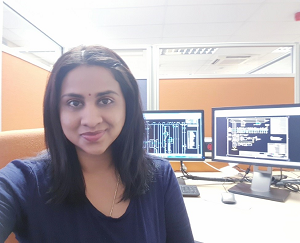
With this chemical qualification under her belt she secured practical in-service training at Proconics; a global electrical, control and mechanical engineering contractors hub. Here she worked in the software department. This exposure to a number of fields of engineering may well have assisted her decide on the direction her career should take.
In 2015 she acquired a B-Tech degree.
At this juncture she decided to shake it up and venture into the electrical engineering department within Proconics. But she lacked the requisite knowledge.
In her search to find where to gain the necessary electrical skills she came across the Engineering Institute of Technology (EIT) – the college offers an Advanced Diploma of Applied Electrical Engineering.
What appealed to her was EIT’s live, online platform of learning which allowed her to continue growing her portfolio of qualifications and sets of skills alongside her work at Proconics.
Mid way through 2017 she successfully graduated and is working confidently within the very technical world of electrical equipment. Seshni’s daily responsibilities include circuit design and among other things she calculates line voltages, line currents, primary currents and secondary currents for power transformers. She has also been given her own projects to manage. She says:
“When electrical drawings lack attention and detail, precision and neatness, I embrace the opportunity to ensure they are done swiftly and to perfection. I perform plant verifications to ensure the final drawings captured represent the equipment and its wiring in the plant. Great emphasis is placed on sizing circuit components.”
Continued professional (and personal) development
Seshni marvels at how the electrical engineering industry has continued to grow and mentions that Proconics has 20 years of service under its belt. She described their activities in the electrical field: they design substations, work with switchgears, organize UPS replacements and automate substations for some of the largest companies in the world including Siemens, Fluor and ABB. The industry is exciting to say the least. Naidoo says:
“If you have a passion for numbers and problem solving, you will find this industry exciting. You are continuously learning in this industry, too.”

For her personal development, the one book Seshni thinks everyone should read during their lives is Tony Robbins’ Money: Master the Game. Her interest here shows that Seshni is determined to make her salary work for her as she saves towards retirement.
But she isn’t finished yet. She intends to continue to pursue knowledge for both her professional and personal development. Seshni plans to get her Electrical Engineering degree through EIT, and by 2020 she intends to be studying toward a Project Management degree as well.
She is determined to achieve these goals, but is satisfied with how far she has come. Reflecting on how her Advanced Diploma of Applied Electrical Engineering contributed to her career she commented:
“I understand much more in the electrical industry than I did before. I am able to troubleshoot and find solutions easier. My projects are running much more swiftly now that I have completed the course.”
- Details
- Written by: Quintus Potgieter
When I learnt that Yoni Wa Mbayo Zengwe wakes up to study and sharpen his professional skills for two hours every morning before work, the rest was not surprising. He is a proficient programmer, follows best practice in industrial communications design, is experienced in installation and commissioning, and is a master of process control and advanced process control - the list goes on.
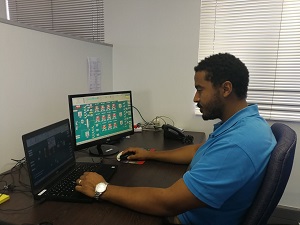
How has he acquired all this?
He began by completing a National Diploma in Electrical Engineering at a tertiary institution in South Africa. This qualification, together with a sound work ethic, prepared him for the work force and so began his journey of endeavor.
In March 2010, he was employed as Junior PLC and SCADA Software Engineer at a system integrating company. In that first year of his career he walked away with the Best Junior Software Engineer award.
Zengwe was keen to broaden his skill base so found himself work in the mining industry. During the following three years he noted with interest that the industry was becoming increasingly automated.
He understood that to remain within engineering and to avoid working in areas being hollowed out by automation; he had to continually upskill and look for opportunities.
Yoni explains that he wasn’t able to go to a ‘conventional university’. He was working on a rotation of 8 weeks onsite and 2 weeks off site, and needed a more functional way of continuing his professional development and furthering his education, while still working. He eventually found the perfect fit for him: the Engineering Institute of Technology (EIT). He recalls enrolling on the Advanced Diploma of Industrial Automation:
“While doing the course I started solving some of the issues we had on site that could not be solved before. I remember while doing the ‘Best Practice in Industrial Communications’ module, I managed to solve intermittent loss of Profibus communications after learning a few tricks from the subject. Studying for the advanced diploma felt like adding at least 5 years of experience to my career.”
Zengwe points out the merits of working alongside his study; he was able to meaningfully and usefully apply and practise his newly learnt skills at work, as he progressed through his course.
It was the flexibility of the live online model of learning which encouraged Yoni to embark on one of EIT’s 3 month courses (designed for professional development). He earned his Certificate of Competency in Allen Bradley ControlLogix 5000 PLC.
But it was the boost his career received (as a result of the advanced diploma), that inspired Yoni to enrol on EIT’s online Bachelor of Science in Industrial Automation. He said:
“I have since been working for another system integrating company. My current work conditions could have enabled me to study part time at a conventional university here in South Africa, but after comparing my knowledge base with other professionals in the industry, I definitely feel like I have got an edge, thanks to what I have been learning while studying at EIT.”
Yoni is motivated by the allure of growing his knowledge base so plans to pursue EIT’s Master of Engineering in Industrial Automation when he graduates from his Bachelor degree.
We at the Engineering Institute of Technology thank him for his loyalty to the college; we congratulate him for his success thus far and wish him everything of the best in both his work and study.
- Details
- Written by: Quintus Potgieter
Kevin Hagen works in the plant and process industry; he is the principal engineer at GHD Consulting Engineers. He works in hazardous areas; grappling especially with flammable gases and dusts.
 He studied for his Advanced Diploma in Applied Electrical Engineering through EIT, in 2011. After his graduation he joined the Institute of Engineers Australia (IEAust) and is now pursuing his chartered status as an engineering associate.
He studied for his Advanced Diploma in Applied Electrical Engineering through EIT, in 2011. After his graduation he joined the Institute of Engineers Australia (IEAust) and is now pursuing his chartered status as an engineering associate.
Kevin says that his EIT qualification formalized many years of practical experience. Furthermore, despite his significant experience in the field, he found that the course was instrumental in expanding his practical knowledge; something other tertiary education institutions hadn’t been able to provide him in the past. He said:
“I have found the practical, technical, knowledge acquired during the course to be of significant value in my work. I have previously undertaken non-vocational tertiary study and found it to be of little practical value.”
March 2018 will signal 40 years of service in the engineering industry for Hagen. However, he isn’t finished just yet. He is determined to pass on whatever knowledge he has amassed to the next generation of engineering professionals - he will be making this a priority. It is a commendable ambition and we wish Kevin well; young engineers learn more from passionate, experienced mentors than from any amount of book learning.
- Details
- Written by: Quintus Potgieter
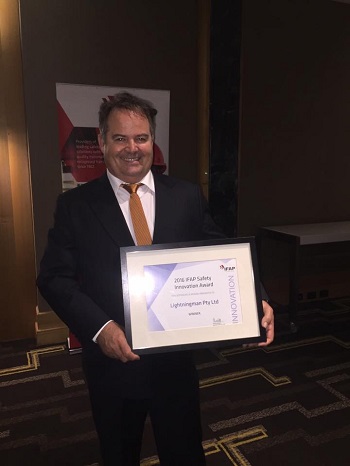 Grant Kirkby is a graduate from the Engineering Institute of Technology. He studied Electrical Engineering through EIT, starting in 2009 and graduating in 2011.
Grant Kirkby is a graduate from the Engineering Institute of Technology. He studied Electrical Engineering through EIT, starting in 2009 and graduating in 2011.
He is now the director of a company that grapples with the most dangerous, most unpredictable forms of electrical current: lightning.
Lightning and High Voltage (HV) electrical discharge events are considered common in engineering industries where outside activities are performed. Those industries include:
- Tented exploration camps
- Exploration drilling
- Pipeline maintenance
- Traffic signal maintenance
- Electrical linseman
- Environmental scientists
- Geologists and surveyors
- Fencing contractors
- Outdoor workers
Kirkby works in Lightning Risk Mitigation, coupled with Occupational Health and Safety. It involves finding a greater understanding and awareness of personal lightning safety risk.
Kirkby owns his own company named ‘Lightningman Pty Ltd’, a company that trades in Lightning and Surge Technologies. They are a specialist distributing wholesaler of Lightning Risk Mitigation products and technologies for higher risk industries.
Since completing his studies, Grant was appointed as the Exclusive Distributor for various Lightning Protection and safety related manufacturers. Kirkby knew the industry lacked a bona fide solution to the risk lightning posed to higher risk operations. He said:
“Since I have completed my studies, I have collaborated with a leading Australian Lightning Researcher to gain a better understanding of lightning risk mechanisms, and the research and development of innovative Lightning Safety controls.”
Through the collaboration, they filed a patent for what Kirkby calls the world’s first portable ‘Earth Potential Rise (EPR) Safety Mat’, for use by higher risk workgroups.
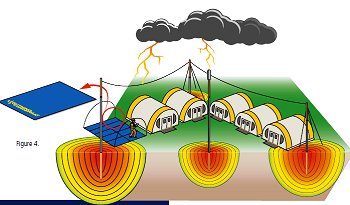
Image: Typical application - Remote Exploration Camp
Operations involving high risk activities in an outdoor setting can utilize Kirkby’s LightningMat to lower the risk of being struck by lightning - the mat lowers the statistical risk of up to 50 to 70 percent.
The invention won the 2016 Industrial Foundation for Accident Prevention Safety Innovation Award. The mat is also cost effective so that industries can make an invaluable, reasonable investment into securing their operations from the weather.
When asked about how his life has changed since he obtained his qualification through the Engineering Institute of Technology, he replied:
“I have a great sense of personal achievement that has since developed into a strong desire to innovate, to make a difference, and to have been seen to have made a difference, personally, professionally, and commercially.”
Kirkby says he is no longer phased by “seemingly insurmountable problems” and tackles engineering conundrums head-on. By no means, however, is Kirkby slowing down, or admitting that there isn’t more to learn about the industry he is so fascinated by. No, Kirkby intends to keep on learning and innovating. He said:
“I am very interested in further Research and Development activities, specifically in product/process development in the area of Lightning Risk Mitigation in higher risk environments. To develop new ideas/concepts that will be the world’s best practice and the technical benchmark that shapes the way higher risk activities deal with Lightning Safety in the workplace.”
Kirkby’s LightningMat is now being exported to four continents ; Africa, Australia, South East Asia and South America.
- Details
- Written by: Quintus Potgieter
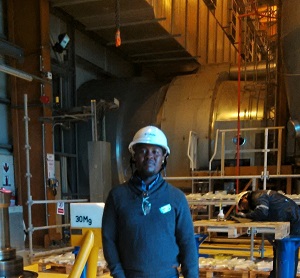 Ntobeko Dan Xulu
Ntobeko Dan Xulu
Ntobeko Dan Xulu is an Engineering Institute of Technology (EIT) graduate and grateful to his employer for the bursary they gave him to study with EIT. He has successfully obtained an Advanced Diploma in Plant Engineering.
He has been working at South Africa’s electricity utility, Eskom, for the last nine and a half years. When he joined the utility in 2008, he spent his time working as a project planner/ planning engineer, eventually becoming a technical project manager. Xulu gained a lot of experience in the field of project management, contract management and turbine maintenance.
He has since progressed to the role of Acting Senior Project Manager in 2017, working parallel also as Project Planning Head of Department in Eskom. Xulu was recently awarded with a Project Manager of the Year CEO Award in 2016.
Online education
Ntobeko was surprised to stumble upon the Engineering Institute of Technology as a prospective education and training institution. He was rightfully critical in the beginning, but found out that online study was perfect for him in the end. He says:
“The idea was less appealing until I downloaded a brochure and I looked at the content in detail. I then enrolled for the Professional Certificate in Mechanical Engineering in 2012. I was comparing it to our South African content of N1-N4 courses. I could not believe what I learned in the first 3 months - it almost covered the entire 2-year South African syllabus.”
He is now hoping to inspire others and share the expertise he has accumulated in a career that is maturing with every passing day. Through utilizing EIT’s ebooks, available in the online library, and the course material, he has been able to continue growing his skillset whilst being on-the-job. He says:
“To be successful in this rare and unique type of education, one has to commit for the duration of the program, and spend at least two hours a day. It is fun because every day you learn new things.”
Student becomes teacher
The course material complemented Xulu’s studies in many ways; he went on to develop a training program for trainees being introduced into the industry via the utility. He also developed turbine and generator fundamentals for a project planners program.
“Most importantly, I learned, formally, how to conduct myself as an engineering graduate and leader.”
He hopes to pursue his Bachelor of Science in Mechanical Engineering next, reveling in the fact that he has credit from his previously earned Advanced Diploma - a testament to the structure of continuity within EIT, says Xulu.
Motivation
Motivation was the key for Ntobeko. His desire for knowledge was incredibly strong. He recalls what kept him so motivated to finish his qualification:
“Knowledge, knowledge, and desire for knowledge. I had so much desire to know. I love turbines, I never lost energy. I was always looking forward to the next set of books from the Learning Support Officer - the EIT books make reading interesting, you start to flow like you’re reading a novel, and you don’t get bored.”
- Details
- Written by: Evangeline Newby
At EIT, we are very pleased to receive the following feedback from one of our MIA01 Master Degree Graduates, Kannan Periyaiya.
Kannan says:
"I am very proud to have been one of the pioneers and batch of the first successful students to complete this course. This course was a huge challenge for me personally. As mentioned before that without the technical writing course skills and completion of MIA01 it would not have been possible. I was almost about to give up until Natalie Holland and Robert Holm provided me the relentless support to complete the course.
In summary, my time with EIT has enriched my life in many ways. It has provided me with the necessary tools to enhance my technical skills even further, taught me valuable information about this diverse world and people and concepts in general and eventually will allow me to hopefully become even more successful in my working life once I’ve finally graduated with my master degree."
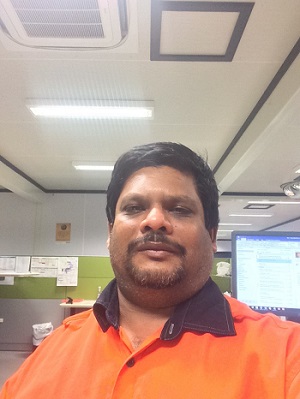
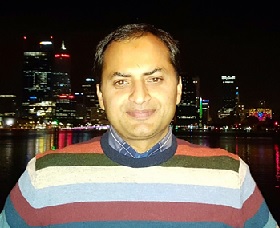
- Details
- Written by: Allison
“I have thoroughly enjoyed the online Master of Engineering in Industrial Automation through EIT."
"It has been difficult two years juggling between work, family and study but well worth it as I have gained a lot more knowledge and confidence to do my job well.
The delivery of online course was exceptional as I had a chance to interact with lecturers as well as other students from the luxury of my own place. In the beginning I was bit skeptical about the online mode of education but the exceptional delivery of online Masters by EIT has changed my opinion. The course was delivered by industry professionals with decades of experience who passed on wealth of information and the most relevant knowledge needed to be successful in the world of Industrial Automation. In the end, I am quite happy that I selected Masters of Engineering (Industrial automation) as post-grad degree and chose EIT as the course provider.”
Muhammad Naveed-Ul-Hassan
Control Systems Engineer
Nickel West
Kalgoorlie Nickel Smelter & Concentrator
- Details
- Written by: Quintus Potgieter
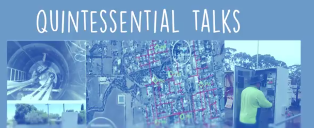 Tom Davies, is an asset and sewerage manager in Australia. He is working on the implementation of a lower budget online monitoring system for a rural wastewater/sewerage scheme in the Shire of Moora. He studied his Masters of Engineering at the Engineering Institute of Technology.
Tom Davies, is an asset and sewerage manager in Australia. He is working on the implementation of a lower budget online monitoring system for a rural wastewater/sewerage scheme in the Shire of Moora. He studied his Masters of Engineering at the Engineering Institute of Technology.
- Details
- Written by: Quintus Potgieter
Pierre Vermoter has 23 years of experience in the mining, maintenance and construction sectors. He currently works for Murray & Roberts in cementation in their mine engineering design office. He is an accomplished mechanical technician with 16 years of ‘hands on’ technical experience. He has also spent some years in technically associated planning, procurement and sales, and then in mechanical and structural design.
Pierre says that the most fascinating development in the industry is the gradual and continuous automation of mining. He believes this mechanization and the introduction of new innovative mining technologies improves the safety and the productivity of the mining industry overall.
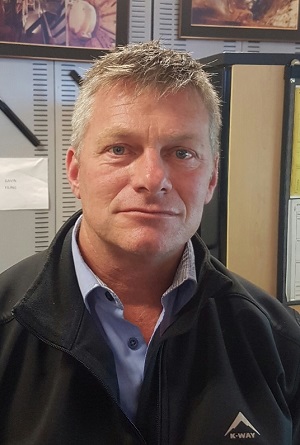
Pierre chalks up his success in the engineering field to having a range of skills and focussing on achieving the required outcomes. He said:
“Career success can be attributed to a result driven, ‘can do attitude’. I have the ability to take ownership of a project and work independently. Specializing in rotating equipment has defined my work style of precision and quality and is driven by attention to procedure and pride in my work. My technical skills are further complimented by an analytical predisposition and a high level of English and computer literacy.”
Pierre recently graduated through the Engineering Institute of Technology (EIT), earning an Advanced Diploma of Mechanical Engineering Technology. The course provides students with a current look at the technologies revolutionizing the Mechanical Engineering industry.
Pierre said EIT’s course gave him “an all-around boost” in terms of his general engineering knowledge; it provided him with a deeper understanding of other engineering disciplines.
“Mechanical Engineering, on a career level, generally finds the practitioner focusing in one particular area and many of the other disciplines get forgotten and left behind because they are not utilized on a daily basis. I’ve now found that a lot of my knowledge has been refreshed and I’ve found I’ve had answers at hand, whereas previously, I had to reference a specialist or do further research. My research has become more focused and better targeted as I have a better grounding now.”
Pierre said that finding out the Engineering Institute of Technology was not only internationally recognized, but locally recognized by the South African Qualifications Authority (SAQA) was the validation he needed to register for the course.
And how does he stay motivated whilst having to work and study? He says he simply doesn’t procrastinate. “It has to be done...so I get it done!”
- Details
- Written by: Edwina Ross

The Engineering Institute of Technology (EIT) is very proud to present a glimpse into the quite remarkable work being undertaken by our students completing the Master of Engineering in Industrial Automation.
These students, who are studying alongside their work in industry, are deep into the research for the thesis component of the degree. They have delivered the first of two progress presentations and it is clear that their projects will have academic applications, but more profoundly, will benefit and improve the engineering communities they serve.
Wherever the students are based in the world EIT’s innovative, live online education enables them to ‘meet’ and ‘interact’ with their globally-based lecturers and student cohort. They are all immersed in their workplaces, but also have access to EIT’s remote laboratories and simulation software; these practical applications underpin the theory in the degree.
The nature of the degree has inevitably focused the students’ thesis topics on the growing industrial automation industry. The relevance and significance of the research projects, however, can be attributed to the fact that they themselves are inspired and driven by the work they do in industry.
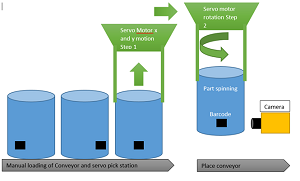
The following is a summary of the intentions behind the Master projects. It does not adequately illustrate the progress being made by these scholars, but it does hint at the pertinence of the research being undertaken for and with industry.
Bryan Crump is an Automation Engineer who is developing a strategy for the optimization of 2D matrix Barcode reading and part placement machinery. His thesis focuses on where the system places objects on a conveyor belt. He is aiming to create a strategy which optimises the placement of objects on the belt to allow the 2D barcode matrix to be scanned by a camera.
He hopes it will be implemented in the pharmaceutical and biological industries. He said: “The objective of this thesis is to define the optimum configuration of the equipment to ensure consistent part placement (within a pre-defined tolerance) whilst minimizing station cycle time and using readily available off the shelf products.”
Kannan Periyaiya is a senior engineer who has proposed an online monitoring platform suitable for machinery protection applications. The monitoring system will utilize the General Electric Bently Nevada 3500 monitoring system. According to General Electric, the system is the “industry’s most extensive selection of machinery measurement parameters combined with software configuration for virtually all monitor options.”
Periyaiya explains that all high-criticality equipment at gas plants is moving to completely online condition monitoring strategies in the future. Thus, the target of his project is to “scope the requirements of connecting these Bently Nevada racks to the existing System 1 Framework to enable continuous vibration monitoring and analysis of all Bently Nevada modules.”
System 1 is a software framework that connects all the vibration measurement hardware at a gas plant and allows the measuring and monitoring of those vibrations. Periyaiya will be implementing his expertise at his current employer, Santos GLNG.
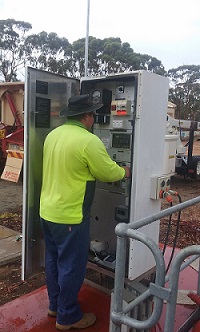
Tom Davies, is an asset and sewerage manager. He is working on the implementation of a lower budget online monitoring system for a rural wastewater/sewerage scheme. He is focusing very specifically on the reliability of such a scheme, and how dynamic the system may be for highly regulated public utilities.
He explains, “At full potential, I see this type of work augmenting works of Professor Duncan Mara at Leeds University in the simplification, increased understanding and effectiveness of a limited budget sewerage scheme. The technology that I am looking at would sit on top of those schemes making effective and reliable wastewater management possible for all rural, and regional economic zones.”
The scheme Davies is proposing would be the first implementation of its kind in the industry. The Shire of Moora, Australia, is supporting the strides he is making and will benefit from the scheme he is proposing.
James Croft is a Control Systems Engineering Support practitioner for a large coal exporter in the Bowen Basin in Queensland, Australia. He has tested and documented state-of-the-art solutions for the Process Control Systems at the BMA Caval Ridge Mine Project. These systems increase the reliability of coal handling. He is also targeting methods which will increase the efficiency of the processing systems in order to attain higher production targets.
Mike Calvert is a metallurgical engineer. He will present his findings on a new control parameter for reflux classifiers on fine coal recovery. He explains that, “The final submission will include a literature review of previous laboratory studies which have progressed to pilot scale tests and then through to early models at full plant scale. The study involves conducting trials at full plant scale, varying the proposed new control parameter and collecting and analyzing samples. It will include a discussion on the new potential for use in a control system to maximize resource recovery.”
Muhammad Naveed-Ul-Hassan works in a nickel smelter providing engineering support in control systems. Many automated initiatives are designed to improve safety (among other benefits), and so it is with this project. The skimming cabins are located next to the converters, exposing the operator to radiating heat and light from molten metal. It is the operator’s job to assess the colour difference between Slag and Matt – a manual process. Muhammad aims to automate this skimming process utilizing state of the art thermal and high resolution IP cameras which will be monitored from a remote cabin. In fact his overall plan involves automating three converters all supervised from a central control room.
- Details
- Written by: Quintus Potgieter
Pardon Makura is an instrumentation and control technician at Eskom’s Medupi Power Station in Lephalale, South Africa. He was awarded the City & Guilds of London Institute’s Gold Medal for Excellency in Electronics in 2002, and earned the Licentiateship (LCGI) Diploma in Electronics, in 2006.
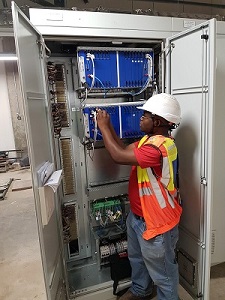
And now he is an Engineering Institute of Technology (EIT) alumnus. He completed one of our Certificate Courses in 2012 and at the end of 2016 he graduated from our Advanced Diploma in Electrical & Instrumentation Engineering for Mining.
Makura works in electrical instrumentation at Medupi Power Station, but was eager to talk about general developments in the power generation industry in South Africa, “Lately, there has been a lot of deliberation on plans to generate power from nuclear energy.”
Eskom, South Africa’s electricity utility, intends to produce 9.6GW of nuclear energy in the near future. The utility issued a request for proposals in December 2016; opening it up to foreign specialists proficient in nuclear energy and interested in constructing a new nuclear power station in the country.
Nuclear power is controversial. It is a particularly sensitive topic with the Fukushima Daiichi nuclear reactor accident still fresh in everyone’s minds and that anxiety hasn’t been eased with countries like Germany opting to move away from nuclear power completely.
Makura says that he has his reservations regarding the safety aspects when it comes to building new nuclear facilities in South Africa. He wonders what assurances the government can give to South Africans if they do, indeed, proceed with their plans. He notes the recent nuclear plant disasters as a leading cause for concern - they could happen to any facility.
Despite the general disquiet South African Nuclear Energy Corporation (Nesca) chairman Kelvin Kemm, however, is certain the country can make a success of a new nuclear power station project. He spoke to Fin24, saying:
“Over forty years ago, in collaboration with foreign partners, South Africa embarked on the construction of Koeberg nuclear power station. That decision turned out to be a great success. This time around we can do even better.”

Image credit: Pixabay.com
The maintenance of nuclear energy power stations is the key to their efficient and safe operation. Pardon Makura believes e-Learning could be the answer to the education and training needs that are likely to emerge with these proposed projects. The online platform of learning allows engineers and technicians to up-skill without giving up work, and means that the best courses and college can be selected. He says:
“I think e-Learning is where the education system is headed worldwide in this era of technology and it’s a matter of time before it becomes the default system particularly in tertiary and professional education.”
Makura, of course, lives in South Africa, where tertiary education fee protests may soon be reignited as the academic year begins. The likelihood of this has been increased with the South African Further Education and Training Student Association (Safetsa) saying that they will be standing in solidarity with the Fees Must Fall movement. They aim to shut down all 50 Technical and Vocational Education and Training (TVET) college campuses in the country, starting this January.
The protests are also related to the delays in results and certificates; according to South Africa’s Independent Online News Source, some students have not received their results or certificates since 2012.
This hiatus is damaging to the economy, as essential as they are, South Africa is failing to produce artisans and tradesmen and women proficient in specialised technical and vocational skills. The finger is being pointed at the Department of Higher Education.
Makura maintains that the answer could be the expansion of e-Learning institutions:
“The government needs to invest human and financial resources into e-Learning because it is not something that is just on paper but a reality! It worked quite well for me because it enabled me to further my education whilst I continued with my work requirements, so it was a ‘win-win’ situation. The major challenge was to make sure that I had good internet access on demand’.
Congratulations Pardon, we at the EIT wish you every success and hope to see you back when you further your education online.
Works Cited
"Eskom Fires Starting Gun on Nuclear Plan." Fin24. 20 Dec. 2016. Web. 19 Jan. 2017.
"TVET Students Threaten to Shutdown Colleges." IOL. 19 Jan. 2017. Web. 19 Jan. 2017.
- Details
- Written by: Quintus Potgieter
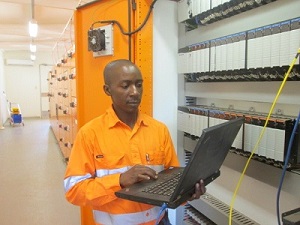
Endeavour Mining’s Karma mine in Burkina Faso, West Africa, is an open-pit mine that produces an estimated 190,000 ounces of gold annually. The mine started construction operations in April 2016, and is expected to run over a 10-year mine life.
The Former CEO of Endeavour, Neil Woodyer, before the operation began, said:
“Once in production, it will become our flagship low-cost mine and will rank amongst West Africa’s top tier cash generating mines.”
Simbarashe Mburuma has worked in the electrical and instrumentation field in mining for the past 10 years. Working in and around Africa, he has taken his expertise to Zambia, the Democratic Republic of Congo, Botswana, South Africa and Ivory Coast.
Mburuma currently works for the Endeavour Mining Construction Team in Burkina Faso, working as an Electrical & Instrumentation supervisor. His day to day tasks consist of installing Electrical and Instrumentation systems in process plants and working with the automation team and he will continue to do so until the project concludes.
This is one of the reasons that contributed to his decision to embark on the Advanced Diploma of Industrial Automation, offered by the Engineering Institute of Technology (EIT).
But it was his opinion of automation generally which ultimately motivated him to register on the course: “Industrial Automation is going to change the shape and control system architecture in most industries, be it mining or manufacturing.”

There is no doubt that automating the mining industry will ensure that mines are less labor intensive, safer and increasingly efficient. Mburuma goes on to say that mining process control is moving so fast that a practitioner has to “keep up with the current trends.”
However, he did clarify that as a staff member of a mine which is constantly striving to achieve its goals, the efficiency and work ethic of the individual is also important.
In this regard, the course introduced Mburuma to a very useful technique during his course; he learned how to implement the Pomodoro Time Management technique; a benefit in both his studies and work.
The Pomodoro Technique is a time-utilization technique that involves studying or working in short, but effective bursts of twenty five minutes each. It is followed by a short break, and then a return to work. Mburuma used it to balance his time between his job and his studies.
He found other aspects of the course valuable too, about which he had this to say, “The program is so rich with educational material used in a day to day environment,” Specifically he mentioned applying the following to his daily operations, “Control loops tunning , electric motor protection and maintenance, industrial communications, PLCs and SCADA technologies - only to name a few.”
Mburuma is now looking forward to pursuing EIT’s Master of Industrial Automation. He commented that the flexibility of the live, online learning approach and the rich course material has enticed him to keep going, “I am empowered by this advanced diploma, I am not stopping here,” he said.
All of us at EIT congratulate Simbarashe on gaining this qualification and we look forward to his return.
Works Cited
"Endeavour Mining Starts Construction of Its Houndé Project, Its next Low-cost Gold Mine." Endeavour Mining Corporation RSS. Web. 30 Jan. 2017.
Image credit: Amazon.com
- Details
- Written by: Quintus Potgieter
Michael James Ingham is a Mechanical Inspector for the QA Team on the Ichthys LNG Downstream Project in Darwin, Australia. He recently graduated from the Engineering Institute of Technology, obtaining his qualification in the Diploma of Leadership and Management.
In 1995, when Michael Ingham finished school he started his apprenticeship in Engineering Fabrication. “I spent a lot of time fabricating and welding in a workshop environment, using radial drills, lathes and milling machines. I also conducted site maintenance on the four bulk carrier ships that run from Gladstone to Weipa in Queensland, Australia,” he remembers.
Michael soon started fulfilling many roles, working in construction and maintenance for various companies as a tradesman, a Supervisor and even a Superintendent. Using multi-million-dollar equipment, he would perform dragline shutdowns on the coal mines ; repairing, overhauling and maintaining the coal mines. He also aided the construction of oil refineries for BP and Caltex. He has worked on Nickel mines and LNG plants - upstream and downstream - throughout Australia, too.
Ingham is employed on a ‘Fly in Fly Out’ basis - thus, expanding his resume in terms of training and education would have proven to be difficult because of his working schedule. But then, he found the Engineering Institute of Technology. With full-time work obligations and family obligations, Michael needed an alternative to brick and mortar universities/training institutions. EIT’s interactive, online training was a perfect option for him.

“As I have been doing FIFO for many years I wanted use my time away from family wisely so it was quite easy to do a little studying each night after work to meet the minimum requirements to complete the course. A little studying each night is all it took to get my studies done and assignments completed without affecting my work,” Ingham said.
The Diploma of Leadership and Management wasn’t Ingham’s first online qualification. He completed his Advanced Diploma of Mechanical Engineering through EIT too - he attributed his success in his current job to graduating through EIT. “This style of training really works well for me,” he admitted.
He wants to go a step further and apply for the Bachelor of Science in Mechanical Engineering next. After that, he would like to earn his Master’s degree - which is also available through the Engineering Institute of Technology.
And, on the prospect of further work, Ingham said: “I would like to gain employment after this project, inspect equipment on a new or operating plant, preferably in Brisbane or somewhere in Australia. I am also keen on working abroad,” Ingham told us.
The pursuit of success in engineering industry is a daunting undertaking for some. Ingham says that education is vital. “I have learned that education can do so much for an individual in the Engineering profession. One person can never cover every aspect of Engineering. I have been able to learn a lot by choosing courses that are right for me and giving it a go.”
- Details
- Written by: Quintus Potgieter
Chris De Lange is our 2014 EIT Graduate of the Year and an inspiring citizen of the world.
As a young man, Chris graduated in 1979 as an electro-mechanical technician. He then worked in the steel industry, underground in black coal mines, as a foreman in an 8000 loaves an hour bakery and later as maintenance manager for four large bakeries. Then, after honing his skills in a number of other industries, he did the entrepreneurial thing and opened his own business; Extreme Welding International. It was at this point that his South African roots began to loosen; his company took him to every continent in the world. Broad in scope and hard-wrought, his experiences were astounding enough to be included in Discovery Channel’s 2005 Extreme Engineering program. Then in 2009 he and his family immigrated to Australia.
In his new country, by necessity, he resorted to his original trade and started from scratch as a fitter. Education seemed the only means to fast-track his career. With distance learning an imperative he was attracted to EIT’s interactive, online training because he had; “classes to attend, a real, living, interested lecturer to ask questions and other students to interact with”. He enrolled in the Advanced Diploma of Mechanical Engineering (DME) and after only ten months (of an 18 month program) he was promoted to reliability engineer for a four million tonnes per annum mine.
Unexpectedly, this remarkably swift impact of his studies on his career was inspiring for his teenage children. They had to acknowledge that Chris’ commitment (probably irritating at times) to both his education and work had paid off.
An aspect of the online course that Chris found enormously valuable was the tandem nature of his learning and work. His efforts on site helped validate course theories and references and by employing these new-found concepts at work he was able to reinforce this knowledge and improve his on-the-job expertise.
More than the skills inherent in the content, however, Chris believes that the value in the program was the confidence it gave him. During his studies he received an astounding work audit rating of A+, and this presented him with a range of opportunities for further study and career advancements.
Chris has expressed an appreciation for the quality of the materials and for the lecturers. Interestingly he admitted that this fuelled his motivation, “… it was challenging to maintain the high standard that I felt I needed to be achieving to do justice to the effort of the lecturers and the high standard of the lecture materials.”
He also became aware of the esteem that HR managers and managers in general are developing for the practical nature of the advanced diploma.
Chris has some invaluable advice for future EIT students: “… tell your family and friends what you want to achieve (lose the friends that laugh at you), enrol immediately, get to know your course co-ordinator, set up a student and lecturer network (a forum to help each other; to discuss problems and bounce ideas off) and most importantly, remember that the taste of success is SWEET”.
I would like to close with a truism from Chris: “I started studying at 50, I passed – even got awarded the EIT Graduate of the Year. If I can do that at 50, with 3 dependents and as an immigrant to a new country, imagine what you could do?”
Finally, to our delight, Chris has agreed to become a part time EIT lecturer – he says it is in order, “… to give back (to future students) some of the knowledge that was given to me with abandon”.
Thanks very much for your help in compiling your story, Chris. We look forward to having you on board.
 |
 |
 |
 |
- Details
- Written by: Quintus Potgieter
 Some special visitors just outside Steve’s study area
Some special visitors just outside Steve’s study area
One of our engineering students, Steve Szekely (pictured), is based at the Australian Antarctic Division station on very remote Macquarie Island in the Southern Ocean. The base is a sub-Antarctic settlement of between 15 and 40 people located at the northern tip of the 34km by 5km island. The island is world heritage listed. We were curious about Steve’s life and work at the station and about how he managed his engineering study obligations, including joining the live interactive webcasts with students from other parts of the world. Steve is studying the Advanced Diploma in Industrial Automation via distance learning using the latest techniques.
Steve’s Career to date
What is your age, and do you have a partner/ family on the “mainland”? I am 44 years old. My wife Julie and our three children are living in New Zealand. What is your career background in brief? My background is as a radio/communications technician mostly in the mining industry but also contracting as a technician in a variety of communications fields. When did you decide that you wanted to do some Antarctic service? I have always wanted to go to Antarctica since I was a boy. I grew up in Tasmania and was fascinated by the stories of adventurers and the extreme conditions they had to deal with. What is your official job title, and what tasks do you have to do? I am a Communications Technical Officer. I am one of two comms personnel, and between us we look after all the comms equipment on the island.
Steve enjoys one of many wilderness treks on Macquarie Island What are some of the unique engineering and technical challenges you have? The things that can cause the most difficulties here are the ever present winds with salt spray, and the wild life. Wind chill can make it very difficult to do delicate wiring work outside. Zero degrees C may not seem very cold until you add 30 knots of wind. Once you take your gloves off you only have minutes before you lose feeling in your fingers and have to stop. As far as the wildlife goes, Elephant seals can cause quite a bit of havoc when they decide to rub up or lean against your equipment enclosures. A large seal is quite capable of knocking down a 1.5m solid wooden fence. Managing Study Obligations

Icebergs and wildlife tempt distraction from studies
Why did you choose this particular course (or what factors were part of the decision?)? I have done quite a bit of work in the mining industry and I have always been interested in the automation and process control side of the operation. I thought that I would like to increase my knowledge in this area and diversify my skill set. The problem was that I could not attend classes in person. Everything had to be done remotely. How long have you been doing it now? I have been working on this course for about a year. How many hours commitment each week is required for you? On average I do about an hour and a half of study a night. Mostly reading text books and working on assignments. Given your location, how do you manage with the online webcasts? As the delegates are spread out all over the world, the question of setting a time for a webcast is difficult. I am given a choice of two or three different times during the day for each webcast and so I just find the one that is most convenient. Others at the site must be studying too in down time, but what special challenges does the location bring to your study time? I try to arrange field trips between study modules so that I can get away for up to a week at a time. If there are urgent repairs needed then that takes priority over studying and webcasts but due to the webcasts being recorded, I can catch up when I return to the station. What’s been good, what’s been not so good with the course? I have really enjoyed the work on PLC programming and control loop tuning as well as the chemical engineering module. It really helped me understand some of the processes that I had seen in the mining industry. I love the flexibility of the study and the access to the lecturers. They have all been excellent at responding to email queries. I guess that there has not been any thing that I would call “not so good”. Some of the modules have been harder than others, but that just adds to the overall sense of achievement. After your term is finished, how will the new qualification help? When I return home I would like to pursue more opportunities in the process control field, in particular the oil and gas industry. I already have considerable experience in industrial data and communications and this qualification helps to bridge these skills into other fields. And finally, what advice would you give someone who has a work commitment and is contemplating one of these courses? To take on a commitment like this is a big task but if it wasn’t hard work then the qualification would not be worth anything. To help with this, the course has been designed with flexibility in mind. The varied webcast times and studying at your own pace can usually be juggled around work commitments without much, or any, interference on your work time. In my own case there was a period when I just could not attend webcasts or study but EIT worked with me to find a solution. I have found the course to be very interesting and rewarding and I am very glad that I started.
- Details
- Written by: Quintus Potgieter
Efficiency and cost considerations mean that more and more people are turning to web-based course work, and this now includes 70 year old engineer Edwin Wakefield from South Africa.
Edwin has just successfully completed a three month part-time course in PLC’s and SCADA Systems, one of a range of courses offered by EIT via distance learning. Edwin enrolled in the class under his own steam and paid his own way, aiming to expand the knowledge he has developed during his career in industry.
Edwin noted that he was extremely supportive and optimistic about online learning today. He said that “the main advantages of online learning are convenience and accessibility and the guaranteed availability of top-class instructors.”
“I’m sure that attending live evening classes can have certain advantages, provided the quality of the instruction is up to standard. This may not always be the case. Unless one’s place of work is close to where the course is presented, attending live classes can suffer from lack of convenience and accessibility.”
The online course was a new experience for Edwin, and included a blend of live interactive webinars led by the instructor, plus reading material and coursework via email, and some one-on-one contact. The live sessions made an enormous difference and provided strong motivation to stay with the course. He reported that the course was “extremely engaging and interactive”. He concluded that he achieved his goal of “gaining a working knowledge that I had been lacking for too long.”
- Details
- Written by: Quintus Potgieter
Online training via the internet really is coming of age when two generations from one a South African company both enrol in the same distance learning course provided by a Perth-based company.
Elite Electrical Services is managed by the Liebenbergs, father and son in a family owned business based in Johannesburg. Both enrolled earlier this year in the Engineering Institute of Technology 18 month Advanced Diploma of Electrical Engineering. And both remain excited about the course several months down the road.
This course is one of many offered online by EIT that attract students from all over the world.
We asked son Chris Liebenberg for some comments about the course, his progress, and what it was like sharing the study with his father.
“Let me say I’m a big advocate for this Online Learning approach,” states Chris. “If it had been this good when I was younger I probably would have studied at least as much as I should have done back then! It is more flexible than classroom based learning. For example, we can always review the recordings of the live sessions if we miss one. But the live sessions presented each week have been fantastic and with an excellent instructor such as we have it is hugely motivational to ‘attend’. I’ve been completely thrilled.”
Mr Leibenberg explained that his background was mainly in IT. He has several of the trade certifications required for electrical work, but both he and his highly experienced father wanted to ensure they remained at the cutting edge of industry by adding to their knowledge of electrical engineering. Elite Electrical Services is a third generation family business and Chris says that right back to his grandfather the emphasis has been upon developing knowledge and expertise to add value for clients. Personal advancement has worked hand-in-hand with the development of the company. It’s in the blood too, it seems, because Chris’s 12 year old son already has his sights set on joining the family business. “He was born with a multimeter in his hand,” says Chris.
Chris comments: “After only a few months I’ve already been able to apply what I have learned in the course to my daily work. It has given me more confidence to tackle complex issues, and in fact I have been surprised by the number of times that what we cover in a week’s work has cropped up in the workplace.”
“We are fortunate our business is still going very strong despite the global recession. We are working our teams 5 days a week minimum when some others seem to be cutting back. I think part of the reason we are travelling well lies in our ability to tackle more advanced work. I think it is important that none of us rest on our laurels or use these tough times as an excuse to delay broadening the spectrum of skills we can offer.”
EIT's Advanced Diploma is an 18-month part-time course, which is quite a commitment for students with full time professional careers to manage. But Chris says he and his father have experienced the benefits first hand and are prepared to put in the hours to be successful. At the moment he is putting in well beyond the 6 hours per week average that the course requires, but this is because he likes to research thoroughly in new subject areas to ensure his depth of knowledge. “Not everyone wants or needs to put so much time into the course,” he notes, “it is just that I like to be fully confident with the fundamentals. We are both definitely highly motivated and the Online Learning delivery provides tremendous flexibility.”
Both father and son seem to be benefitting by doing the course together. They have developed some “healthy competition” over their assignment work but also compare notes and discuss some of the exercises and problems presented by the instructors. “My father occasionally needs some help with his computer connection, and in return it is good to have someone close by to discuss the material with,” reports Chris
Does Chris have any advice for someone contemplating enrolling in this course? He says “Yes, go for it.”
- Details
- Written by: Quintus Potgieter
A student on our recent Hazardous Areas course was kind enough to share some photos with us of a recent potentially hazardous encounter at a mine in Phalaborwa.
The mine is almost entirely occupied by wild life. Game farms and Nature reserves overlap, so the animals migrate over vast areas freely. There are lots of animals that frequently visit the mines in the area on a regular basis. These larger animals as well as the predatory animals very rarely come into contact with humans because of their natural instinct to avoid man, but some that are as large as this Elephant and not particularly afraid of Man, do sometimes venture to graze on the shrubs that are on site.”
It’s a nice reminder about the challenging and interesting experiences our colleagues around the world have, and the different working conditions out there!

- Details
- Written by: Quintus Potgieter
In a recent phone discussion with the EIT’s Ric Harrison, a Senior Course Advisor, the student made some very valid comments for people who are contemplating the value of adding a recognised qualification to their CV’s.
This student completed his Advanced Diploma of Industrial Automation in 2010, and is just two Modules from finishing his Advanced Diploma of Applied Electrical Engineering.
EIT: You must value these courses, now that you have almost completed your second?
Student: Well, it has not been easy, juggling work, family and study, but the courses material has been very, very useful in my daily work. On more than one occasion I’ve been faced with some issue at work and realised that we’ve covered it in the lectures. Back at home I’ve reviewed my notes or replayed the recording of the webcast then gone back to work the next day and actually been able to apply the knowledge to fix the issue. To me it just proves how practical and “real life” most of the material we study has been.
EIT: Yes, and part of the mix iS the background of the lecturers. They can generally draw from their own experiences to give those real life examples.
Tell us about your career path since you started studies. Has the qualification made a difference?
Student: There’s no doubt. I’ve been made responsible for commissioning some major projects and now work at a level well above where I was before starting these courses. And prospects are very good indeed. If I compare my work now to colleagues who have basically not taken on any extra study, it is even more obvious. Most of them are still “on the tools”, and I am moving on from that. I still like some hands-on work, but now I spend a lot more time in supervision and more challenging project management.
EIT: And you’ve referred a couple of your colleagues to us, too.
Student: Yes, they have started the advanced diploma of industrial automation. Actually a couple of years ago I was on a major project with a big name corporation. The market changed and the entire billion-dollar plus project was shut down. The whole workforce was retrenched, including the trade-qualified staff. I’ve kept in touch with a few and from what I’ve learned, most of them are still working directly in their trade, but they have not progressed. I am sure that if they wanted to move up in their careers they will need more than experience to get considered for the better jobs. Put the CV of someone with a relevant advanced diploma plus experience alongside a CV from someone who is going to rely upon their experience alone, and it is pretty clear what 99% of employers will choose.
EIT: Thanks. That’s a good way to think about it.
- Details
- Written by: Quintus Potgieter
Engineers and technicians are often expected to have a breadth of technical knowledge, sometimes spanning a range of disciplines. (This is despite increasing specialization in the workplace.)
To acquire broad skill sets is onerous and an ongoing endeavour, but does prevent tedium and boredom in the workplace. It also equates to improved employability because versatility is extraordinarily attractive to employers. (And for those considering a future in a business of their own, this versatility is critical.)
One of EIT’s recent graduates, Jean Jacques Missango (JJ), is just such an employee. He is from Cameroon, but now based in Canada. As a gas turbine specialist, with electronic and electrical skills and some mechanical aptitude, he straddles the different engineering fields. He explains that he is working in his ‘dream career’; performing general overhauls, routine and non-routine mechanical, electrical and instrumentation maintenance, repairs and trouble shooting of turbines.
JJ had always wanted to further his knowledge in the field and realised that EIT’s online Professional Certificate of Competency in Gas Turbine Engineering meant that he could continue to work and, alongside side this, complete his studies.
When it comes to online learning with EIT, JJ states that ‘The efficiency of this (learning) method is just incredible’.
As a part of his studies, JJ was required to attend live, online webinars and exclaims that attendance was well worth it. He refers to his lecturer as a ‘master’ on the topic and feels that this real time component (of an otherwise online program) was responsible for keeping his passion for the course alive. He also explains that scheduled webinar times allowed him to keep work a priorty.
JJ makes special mention of the student support provided by the EIT team. His dedicated Learning Support Officer gave both the administrative assistance and ongoing encouragement needed to help him through the course.
In conclusion, JJ makes a heartening comment. He believes the course contributed to his improved confidence and ‘considerable status change’, both of which have ‘fueled’ his desire to continue learning.
Thanks very much to JJ for his help in compiling this Student Story.
From all of us here at EIT, our congratulations go to JJ for graduating from the Professional Certificate of Competency in Gas Turbine Engineering.

- Details
- Written by: Quintus Potgieter
Here is what some of our graduating students from the Advanced Diploma of Industrial Automation had to say about the course:
It was a great course, excellent revision for the topics that I am familiar with. Gained greater in depth understanding for the topics that I am not so familiar with, and with regard to new topics demystified some concepts I had no real grasp on, and in the process learned some practical methods that can be applied straight away."
Deon du Plooy - Tasmania, Australia
“The course has really given me a better understanding of process control and automation. I understand my job and industry better. I can explain the intent behind some engineering designs in the chemical process environment. Because of the depth of understanding and exposure that I displayed, some of my colleagues have registered on some courses with EIT”
Adelodun Adeolu Ayodeji - Chevron Nigeria Ltd
“I am extremely happy I attended this course it has been the best course I have done to date. The information provided has been more than sufficient and the presentations were great, I have applied many of the principles that were taught during this course almost immediately into my practice and it has opened my eyes to pitfalls otherwise hidden from an engineer. I will definitely be attending another course is the near future.”
Henk Barnard - Iritron, South Africa
- Details
- Written by: Quintus Potgieter
Frank, based on site in Malaysia, talks to <Senior Course Advisor Ric Harrison in Australia. He is a current student of Advanced Diploma of Industrial Automation and the Advanced Diploma of E & I Engineering for Oil and Gas Facilities.
- Details
- Written by: Quintus Potgieter
Here is an interview with . He is an instrumentation and electrical technician who is currently working on an offshore platform. Listen to him talk to
Please note that audio is slightly distorted at the beginning of the interview, but improves after a short interval: Podcast (mp3, 8’ 06”)
- Details
- Written by: Quintus Potgieter
Positive feedback from students is humbling and amazing, but it is particularly extraordinary when it comes with gratitude for what is a fairly gruelling process. Those of you who have undertaken the EIT’s online courses (3 month certificate courses through to eighteen month advanced diplomas) will agree that the going can be tough. It is a feat to just successfully complete a qualification, but when it is achieved whilst juggling full time work and the responsibilities of family it is quite remarkable. Before relating this short tale, therefore, congratulations is in order – to all graduates – but especially, and obviously, to those of you who have graduated through the EIT.
One of our South African students, Rephinus Omoro, has recently graduated from the Advanced Diploma of Mechanical Engineering – one of Paul Celenza’s DME02 cohorts. When Rephinus started investigating further study he was (and still is) working for Kusile Fabrication Pty Ltd, as their CNC Foreman; responsible for programming the Computer Numerical Control (CNC) machines and overseeing the machining production process. Quite fulfilling, but he was looking to upgrade his skills and anticipating opportunities for promotion. Because he wasn’t able to put work on hold while studying, the EIT became an attractive option; online, flexible and specialising in a range of engineering fields.
It was interesting to learn from Rephinus about his ability to cope with this extra commitment in his life. He admitted that it was his family who took the brunt! He did have to sacrifice some family time, but as each assignment was completed and submitted he was able to compensate as that was when the pressure eased a little. He believed that despite the extra stress the key was to maintain a peaceful atmosphere at home – necessary for the family when the dynamic has changed and to facilitate his daily study program.
He was also asked about the challenges of his particular study ‘trench’ – how had he coped with the hungry trench rats (submission deadlines) and the deep mud (general and on-going rigour of the course)? His answer was not surprising - self discipline, including a daily study agenda. His kind words to Paul, however, illustrate the value of the Online Learning coordinators’ support to the study process: “You’ve been so patient and have inspired me to complete my assignments even when I was almost giving up.”
Other aspects of the EIT online learning process assisted Rephinus too. His ability to listen to the lecturers’ live webcasts as often as necessary helped to reinforce the course content for him (the recordings are sent to students as soon as they have been delivered). And the flexibility of the course – if something prevents you, part way through the course, from continuing your study, you can take it up again with a subsequent cohort of students later on.
In the main, however, Rephinus’ gratitude was for the course itself – in his words: “The course was designed in a way that allows the learner to directly apply what has been taught to real-time problems in the work-place” (an argument for studying and working supposedly – despite the time burden). He goes on to say: “I have gained the skill to anticipate the consequences of new designs and to initiate solutions to problems. I have new programming skills and can complete tasks or projects to specification at my first attempt.”
Thanks very much to Rephinus for his assistance with this article and we, at the EIT, all wish him everything of the best.
- Details
- Written by: Quintus Potgieter
Wisdom is elusive, but education goes a long way to tracking and pinning it down.
If it weren’t such a demeaning term Murray Langley could be the EIT’s ‘Poster Boy’. Since completing the Advanced Diploma of Electrical and Instrumentation (E & I) Engineering for Mining (DMN), he has successfully passed the Vocational Graduate Diploma of Project Management in Industrial Automation (GPI) and has commenced the Graduate Diploma of Project Management in Electrical Engineering (GPE). Quite remarkable!
 Like most other EIT students Murray has achieved these qualifications whilst pursuing a demanding career. He is with Cristal Mining Australia as Project Coordinator Electrical & Instrumentation for their East Australian mining sites. (A promotion, he believes, was aided by his study with EIT.)
Like most other EIT students Murray has achieved these qualifications whilst pursuing a demanding career. He is with Cristal Mining Australia as Project Coordinator Electrical & Instrumentation for their East Australian mining sites. (A promotion, he believes, was aided by his study with EIT.)
Inevitably, despite being busy, it is his career which was and continues to be his primary motivator for education. To be more specific, he aims to enhance his knowledge-base, improve his opportunities within the company and his professional standing in Australia.
Let us get back to that somewhat incongruous title! It was actually inspired by Murray, who, describes the positive effect his study with the EIT has had on him. We know that ‘wisdom’ is associated with aging, but merely entering one’s dotage is most often not enough. It is invariably a combination of lessons; both academic and those dealt by life, which may qualify a person to own such a label. Education, on the other hand, when it is relevant, practical and properly targeted will most often achieve its ends, including; expertise, confidence and insight.
Murray wrote that he saw himself as “more professional” and that he can now “approach my project work much more strategically; having developed a much better understanding of financial, planning and implementation processes that make projects successful.” And, assuredly, to Cristal Mining’s delight, “I have become much more astute regarding valuing projects and understanding how to reduce costs and ensure sustainability.”
Pursuing part time study, however, is challenging. For Murray it is the pressure of completing the requisite assignments. He explains what is necessary, “…a great deal of persistence and time management, to ensure I am able to complete work within time-frames.” On the other hand, he feels a highlight of this particular teaching methodology is the ability to discuss content issues and challenges with lecturers during the interactive webinar sessions. He goes on to kindly praise EIT for its professionalism and is very pleased that his qualifications will allow him to feed in to the EIT’s new master degree. Finally, Murray has a piece of advice for would be students:
“Download Moodle onto your phone!” (This is the Learning Management System that we use)
And he adds something heartening:
“Persevere! The work is not that hard for someone who has been in the industry for a while.”
A great big thank you to Murray for his assistance in writing this.


